#snk meta
Explore tagged Tumblr posts
Text
I can’t get over the fact that seeking out physical mementos of his dead loved ones is something Levi has been doing since he was a young child. He sought out his mom’s tea set because it was the last tangible symbol of the life she lived and the impression he had of her—never wanting to forget her. Levi keeps inside of him the memories of every person he has ever lost.
Levi does the same thing again when he loses his squad in the “Female Titan” arc, and he cuts out Petra’s Scout badge from her uniform. He wanted a physical reminder that they had lived. These physical reminders are signs of who they were when they were still alive. To Levi, everyone deserves to be remembered as such. There’s such tragic selflessness in Levi, though, that he willingly gives up that last memento of Petra to help alleviate the grief of Dieter, who had just finished accusing Levi of being “devoid of humanity” and then endangered all of them in an attempt to retrieve the body of his dead comrade. Levi consistently forgoes his own needs to help others.
That same tragic selflessness is present in Levi in “Bad Boy” because Levi was ready to die in order to preserve that last impression he had of his mom, the one good thing he ever had. Let that sink in. Levi didn’t even fully remember his mom, but the mere impression of her was the one good thing he had. That says volumes about the suffering Levi must have experienced in his short life up until that moment. He truly does not see any worth in himself or in his own life. He actively endangered himself in “Bad Boy” because of this. He was suicidal.
And yet, Levi values the lives of others beyond anyone else. He seeks to give their deaths meaning. All this, despite seeing no greater value in himself beyond his ability to help people. Levi sees others’ lives as inherently valuable, but not his own.
It is significant to note that Levi’s powers awakened from a desire to protect. It wasn’t until the men attacking him in “Bad Boy” spoke horrific things about his mother that Levi fought back with the intention to protect his mom’s image. It was that moment in which he awakened.
The trauma of going into a situation fully expecting to die and then coming out of it having murdered multiple men is immeasurable. Levi never wanted this life of violence, as evidenced by the fact Levi peacefully asked multiple times for these men to give him an item that was rightfully his in the first place. Then, this bastard with the glasses later attempts to carve into Levi the idea that Levi’s own mother would be disappointed in him and hate him for having defended himself—when the only reason Levi even fought back was to protect her image. The tea cup breaking at the end acted as a metaphor that Levi had sullied his own image in the eyes of his mother, reinforced by the likely fact that it was his newly awakened strength that broke the handle—Levi views himself as the problem. The title “Bad Boy” is in reference to Levi’s perception of himself as a bad boy.
It is clear to me that the only thing that motivated Levi to live after all this was the idea that he could possibly do something good with his newfound strength—even though he viewed it as a monstrosity within him, being the cause of him destroying the last memory of his mother and resulting in him killing multiple men (likely for the first time). His newfound strength was also associated with leading directly to Kenny abandoning him. As such, there is no other reason Levi would have wanted to keep living otherwise. All of this speaks to an innate goodness in Levi. His selflessness is both his greatest flaw and his greatest strength.
#levi ackerman#aot bad boy#attack on titan#shingeki no kyoujin#shingeki no kyojin#aot#snk#aot.meta#meta.levi#c: levi ackerman#my thoughts#aot meta#snk meta#levi ackerman meta#attack on titan meta#shingeki no kyojin meta#bad boy
255 notes
·
View notes
Text
How AOT's main trio set Ymir free
Eren, Armin, and Mikasa all taught the Founder Ymir valuable lessons, and were instrumental in setting her free. All three of them caught Ymir's attention and she made the effort to reach out to them personally in different ways, observe them, learn from them.
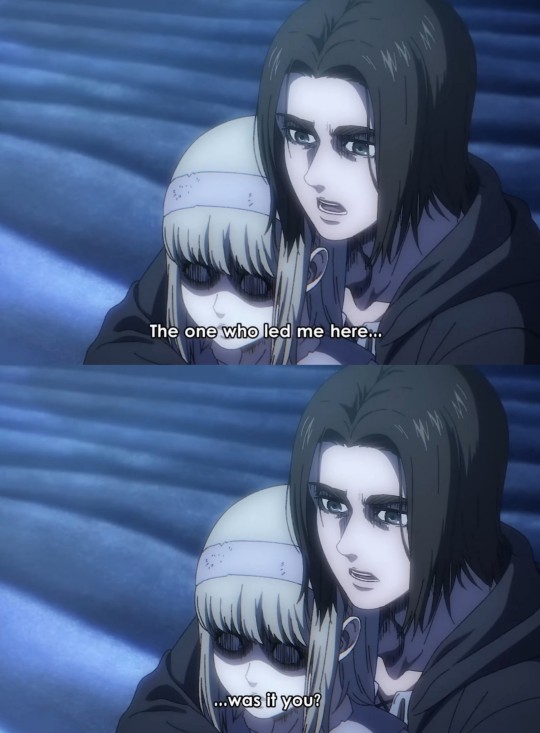
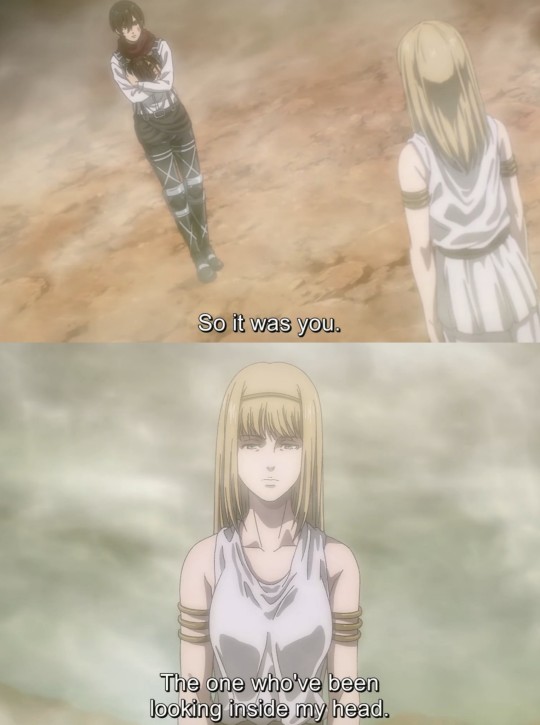
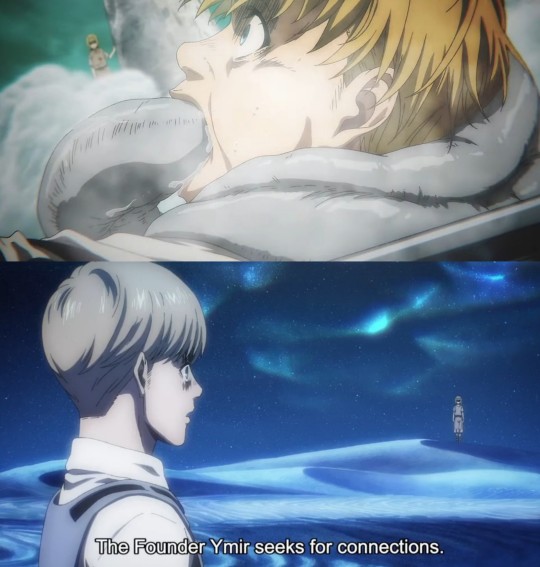
First Eren reached her in the Paths and told her that she's her own person, and can choose what SHE wants rather than follow orders. This was the first time in her long, miserable life, that someone called her a human being. The first time in 2000 years (that would have felt even longer in the Paths, closer to millions of years), that she was told what happened to her was wrong. In her life, she had spent her whole life as a dehumanized slave without any acknowledgement of her own humanity. Eren opened her eyes (literally) to the injustice of her situation and taught her autonomy.
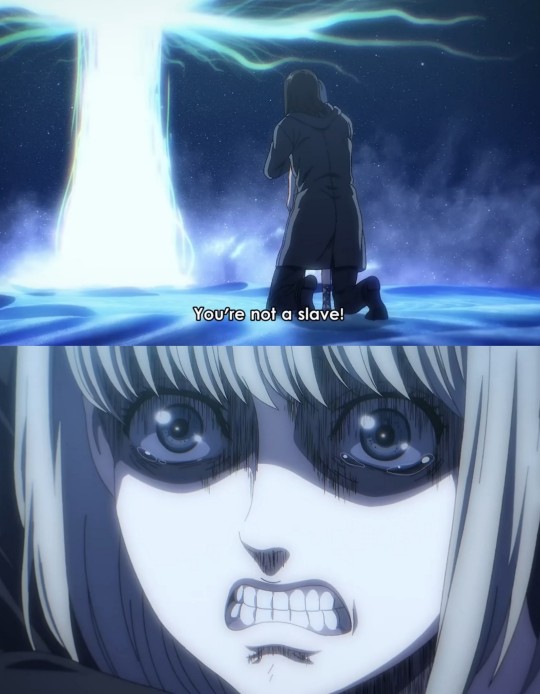
Then Armin arrived to fight Eren, and Ymir watched his every movement closely, even stealing him into the Paths with the Okapi and trapping him there. She watched his conversation with Zeke where he shared that the meaning of life is in appreciating the little moments and the love you already have rather than chasing an unattainable dream. In her life, she longed for an unattainable love/validation from King Fritz who was incapable of giving it to her, since he's a monstrous psychopath. She lived and died yearning for something she would never receive, rather than living for what she had (her daughters). Armin taught her the true meaning of life.
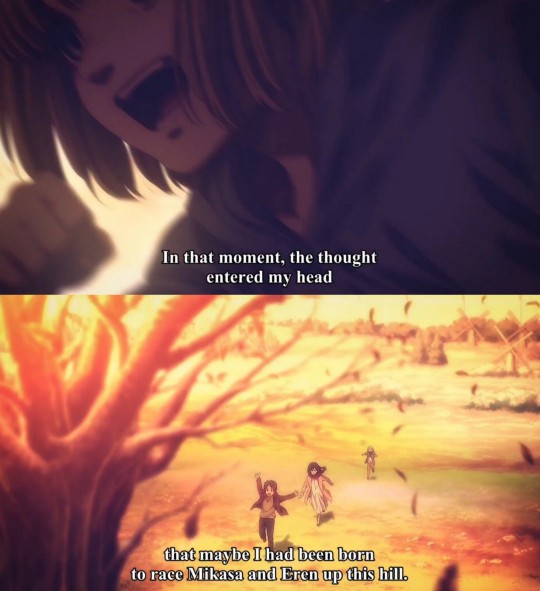
Lastly, Mikasa. From the moment Ymir noticed Mikasa's love for Eren, she was intrigued. She began to peak through Mikasa's lifetime memories, causing her headaches. Then Mikasa killed Eren despite loving him, knowing it's the right thing to do and proving she's not a slave. Ymir herself couldn't do this in her own life, instead choosing to die for the monster she loved, instead of killing him. Mikasa taught her that love does not equal submission.
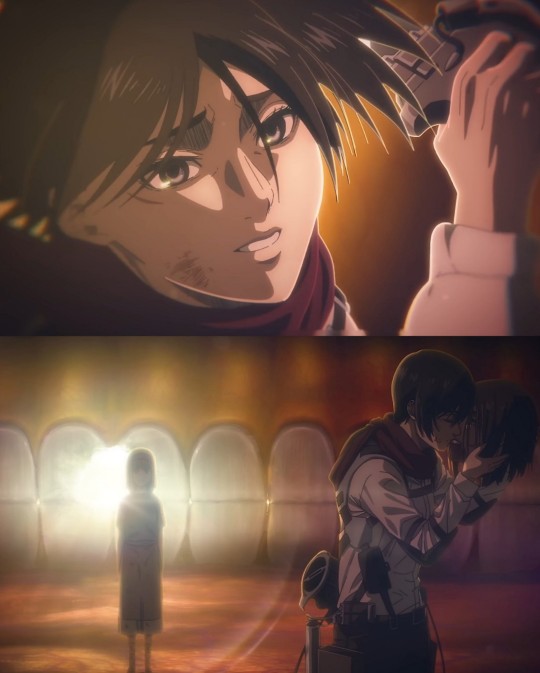
In the end, all three of the main trio were instrumental in setting Ymir free. In her last appearance, Ymir had a vision of what she wished she had done, what she WOULD have done had she received these three lessons earlier in her life. She would have protected her beloved daughters, the truly important and precious things in her life, rather than being a slave to the abusive king. If she were given another chance, she would have let him die.
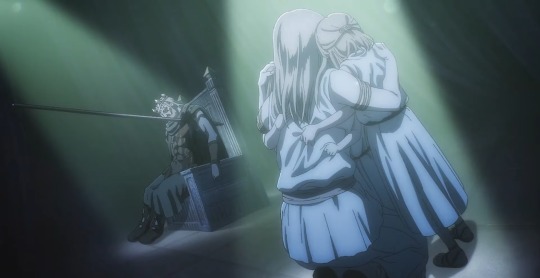
In the end, Ymir's deepest most primal desire was a pure and loving human connection, some semblance of tenderness and care, something she was so deprived of. This desire was so strong that it bled into every single Eldian, connecting them all to Ymir through the Paths. One lonely, abused little girl's desperate need to be loved, enveloping every one of her subjects, binding them all to her in an all-consuming web. She has always been desperately reaching out to other people.
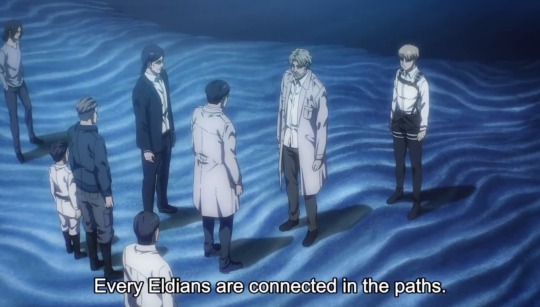
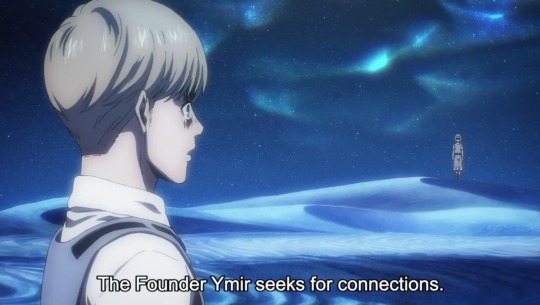
In her ill young mind she mistook the king's sick """rewards""" as that love she craved. Eren made her realize "what he did to me was wrong and I have a right to my anger", Armin made her realize "I shouldn't have waited for love from him that would've never come and instead cherished the love of my children", Mikasa made her realize "I should have let him die/killed him myself". Acknowledging all this and making peace with her tragic life and the decisions she made, allowed her to let go. She finally moved on, and in this moment, she appeared not as an immature child, like she did throughout the Rumbling, but now as a grown adult woman.
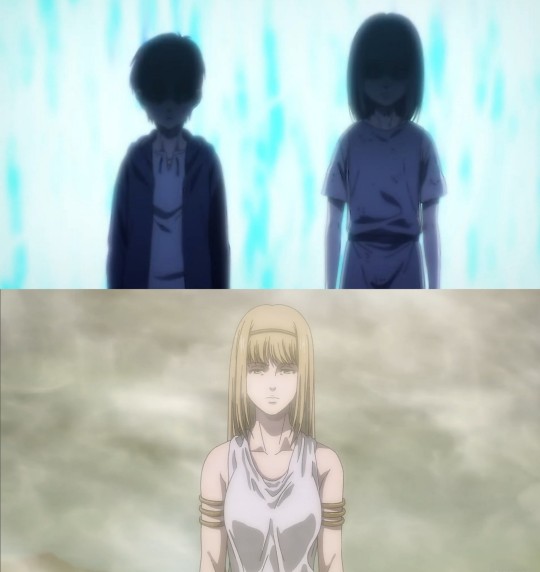
Ymir's story in the finale is essentially a coming-of-age story from the perspective of a mentally ill, dehumanized slave. She starts the finale as someone with arrested development lashing out at the world, and ends it as an adult at peace with herself. Eren invited her to indulge in her rage. Armin helped her consider what was truly important. Mikasa healed her and allowed her to let go. All three protagonists were valuable and influential in freeing Ymir.
#shingeki no kyojin#attack on titan#snk#aot#snk meta#aot meta#mikasa akerman#eren jaeger#eren yeager#armin arlert#ymir fritz#king fritz
117 notes
·
View notes
Text





1. The mother and child reminded him of his time with his own mother. This time with the difference that he had the power to protect that starved mother & child from having the same fate as Kuchel.
2. He knew what would've happened to Ramzi hadn't he stopped the Marleyans because he had already experienced the cruelty of those in power just because he wanted to take back what was already his.
Now we're even more certain of Levi Ackerman's caring personality and compassion ❤️
#levi ackerman#levi bad boy#snk#shingeki no kyojin#attack on titan#aot#snk spoilers#snk levi#snk thoughts#snk meta
178 notes
·
View notes
Text
Should Levi and Hange have fought after the events of Shiganshina regarding their disagreement?
I've seen people say that Hange and Levi should have had a certain altercation regarding Levi's decision to pick Armin instead of Erwin, or that their friendship should’ve been “fractured” by Levi’s decision (see post below). The person then was going in further detail in the threads as to why that should’ve been the case, but their threads were quite long. The general idea of their thread remains that Levi and Hange’s bond should’ve been weakened by his decision.

Here is another take like that as well (I won’t even go into the details of how this person even misinterprets Levi’s decision by saying he was selfish for letting Erwin go, but they do that too):

I’ve also seen people discuss how the moment between Levi and Hange in the woods from chapter 126 should’ve actually been about them discussing Levi’s decision, as seen by this post below (the chapter in this context refers to chapter 126 as it was posted right after the release of the chapter in the manga).

And to all that, I'd like to counter-argument, showing why such “fight” scene between them is unnecessary in the manga and why Isayama hasn't included anything alluding to a form of altercation between Levi and Hange, let alone in a scene where the physical closeness between the two is at its highest, and the reason for that is quite simple: their disagreement was resolved the same day that it happened in Shiganshina, because both Levi and Hange are mature people who can still respect and support each other regardless of their disagreements. I think people claiming that Levi and Hange's relationship should've been weakened after Erwin's death due to Hange feeling some sort of resentment towards Levi don't understand the nature of Levi and Hange's bond in the first place, or they would've rather preferred a version of their relationship that fights and bickers over pointless things, which plays in the idea that some people really don't see Levi and Hange as close enough if they believe such ideas about their bond.
I've even seen people state that the reason they don't like Levi and Hange's relationship is because they "don't fight enough", so this is why they would've liked to see a scene where they fight. Disliking Levi and Hange's relationship is totally valid of course, but to dislike it because they didn’t “quarrel” enough shows these people misunderstand Levi and Hange’s relationship. This is not a post trying to tell people they should like Levi and Hange’s bond after this, but I do want to explain why such fictional quarrel didn’t happen in the manga. This isn’t something Isayama forgot to add or overlooked. Such quarrel simply isn’t necessary to be portrayed, and it is clearly stated in the manga.
In chapter 85, The Basement, we see Hange clearly express their opinion about Levi's decision, which is that the serum should've been given to Erwin instead of Armin. They don't hesitate to disagree with Levi, because despite being close, people can still have disagreements over things and not destroy relationships over them, which is Levi and Hange's case. However, Hange adds that Erwin entrusted Levi with the decision to give the serum to someone Levi thinks is the best suited to receive it, and since Levi chose Armin, Hange respects his decision. Here is the manga panel in question to better put everything into perspective:

Hange's quote at the end of this exchange, "There's nothing more to say", perfectly encapsulates the end of their disagreement. Hange won't go over Levi's decision or will question him on it, because they respect it. This scene actually shows how mature both of them are, and despite their differences in opinions, can still continue to mutually support and respect each other. Why should Hange shout at Levi for an opinion they don't share? Their relationship is deeper and closer than getting angry over pointless disagreements. The deed is done, and Levi made his decision, which Hange respects despite not agreeing with him. Seeing Hange get mad at Levi for no choosing Erwin would be completely out of character for Hange, because despite having bouts of anger sometimes, they would never get angry at Levi for making such a difficult decision. Therefore, claims they should've reopened the subject in the forest in chapter 126 when they're both at their most vulnerable, Levi physically and Hange psychologically, don't really make sense as that subject closed that day in Shiganshina at the top of the wall. As Hange very well said it, there was nothing more to say.
This actually reminds me of the interesting parallel chapter 132, The Wings of Freedom, makes between Hange and Floch as the two characters dying in that chapter. Both of them openly disagreed with Levi's decision to choose Armin instead of Erwin, but where Floch could never accept it, hence why he decided to follow Eren as this "new devil", Hange on the other hand not only disagrees with him when they say that they can't give up as they must stop Eren's genocide, as seen by the panel below, but they approve of Levi's decision by appointing Armin as the next commander after them, which is the reason in my opinion as of why Armin was chosen as commander and not Jean or Levi, as some people felt it would've been better to see either Jean or Levi as commanders rather than Armin.

This is the panel in which Hange makes Armin the next commander, effectively upholding Levi's decision. This scene is the culmination of Hange's respect for his decision regardless of their own opinions on the matter.

Hange didn't make Armin commander simply to validate Levi's decision, as they tell Armin their reasons on why they believe Armin is suited to be the commander after them, but I think we can also read Hange's appointment of Armin as them accepting Levi's decision compared to Floch.
So, if we come back to our original question, should Levi and Hange have fought after the events that happened in Shiganshina, the answer is no, and it makes sense narratively-speaking in the story for both Levi and Hange.
#attack on titan#levi ackerman#hange zoe#erwin smith#armin arlert#floch forster#aot meta#snk meta#aot#snk#levihan
58 notes
·
View notes
Text
aot post-canon character dynamic that i'm suddenly interested in: armin and reiner
armin generally puts aside his own feelings--or more like doesn't consider them in the first place--and is pleasant and kind to people, right
now remember that scene where there was a delay in preparing the flying boat. armin's immediate suggestion was for him to stay behind to delay the colossal titans (and die), said in a 'this is unfortunate but it only makes sense, nothing that can be done 😔' way. jean was like wtf no, you're our best chance to both stop eren or reason with him, this is a horrible plan. then reiner immediately volunteered to stay behind, but with a much more obviously ..sad, self-hating demeanor.
i think this way that reiner tends to be very obvious about what armin's also feeling but not expressing (and would probably find pathetic to express) would annoy armin. despite his best efforts not to be annoyed lol. and it could be messy and interesting, they would get closer in the end + armin would have to confront his attitude towards himself a bit
61 notes
·
View notes
Text
Levi and Post-Traumatic Stress Disorder
TW: mentions of rape and childhood sexual abuse
Throughout the course of Attack on Titan, and even before the canon timeline, Levi experiences innumerable traumas, not the least of which are repeatedly experiencing the deaths of his closest friends and comrades. By the end of the series, Levi has lost every single person he had been close to, being the last of the Survey Corps' veterans. Given the truly immense amount of traumatic events Levi suffers, it'd be difficult to believe that he wouldn't have post-traumatic stress disorder (PTSD), and indeed, he does display several key features of the disorder.
Paraphrased, the DSM-5-TR PTSD criteria are as follows (American Psychiatric Association, 2022, p. 301):
Criterion A: stressor (one required)
The person was exposed to: death, threatened death, actual or threatened serious injury, or actual or threatened sexual violence, in the following way(s):
Direct exposure
Witnessing the trauma
Learning that a relative or close friend was exposed to a trauma
Indirect exposure to aversive details of the trauma, usually in the course of professional duties (e.g., first responders, medics)
Criterion B: intrusion symptoms (one required)
The traumatic event is persistently re-experienced in the following way(s):
Unwanted upsetting memories
Nightmares
Flashbacks
Emotional distress after exposure to traumatic reminders
Physical reactivity after exposure to traumatic reminders
Criterion C: avoidance (one required)
Avoidance of trauma-related stimuli after the trauma, in the following way(s):
Trauma-related thoughts or feelings
Trauma-related external reminders
Criterion D: negative alterations in cognitions and mood (two required)
Negative thoughts or feelings that began or worsened after the trauma, in the following way(s):
Inability to recall key features of the trauma
Overly negative thoughts and assumptions about oneself or the world
Exaggerated blame of self or others for causing the trauma
Negative affect
Decreased interest in activities
Feeling isolated
Difficulty experiencing positive affect
Criterion E: alterations in arousal and reactivity (two required)
Trauma-related arousal and reactivity that began or worsened after the trauma, in the following way(s):
Irritability or aggression
Risky or self-destructive behavior
Hypervigilance
Heightened startle reaction
Difficulty concentrating
Difficulty sleeping
Criterion F: duration (required)
Symptoms last for more than 1 month.
Criterion G: functional significance (required)
Symptoms create distress or functional impairment (e.g., social, occupational).
Criterion H: exclusion (required)
Symptoms are not due to medication, substance use, or other illness.
--
I've indicated the symptoms that apply to Levi, or that I believe likely apply, based on canon content in purple. Let's go one by one.
Criterion A: stressor
During the canon timeline, Levi was exposed to both large amounts of death and threatened death, primarily due to titan casualties, but also due to the circumstances of poverty and deprivation in the Underground. Notable examples include witnessing his mother die and decay while he starved as a young child; Furlan and Isabel's deaths; the deaths of Petra, Oluo, Gunther, and Eld during the Female Titan arc; the loss of Kenny; Erwin and the new recruits' suicide charge against the Beast Titan; and Hange's sacrifice.
Levi experienced multiple instances of serious injury, with the most significant being his injuries resulting from the thunderspear explosion and the Battle of Heaven and Earth. Given the nature of blast injuries, it is likely Levi suffered from internal damage—in particular, rupture of the respiratory and hollow organs, such as the lungs and bowels. We're also shown he suffered complete separation of the index and middle fingers of his right hand, as well as ocular damage to his right eye. A concussion and perhaps a traumatic brain injury following the blast is also likely, as well as hearing damage. Following the Battle of Heaven and Earth, he also experienced significant injuries to one of his legs, necessitating the use of a wheelchair three years post-Rumbling.
In regard to actual or threatened sexual violence, Levi was born and lived in a brothel, in which his mom was a prostitute. It's not an exaggeration to say Levi was likely the result of rape. Given the circumstances of his upbringing, it's also likely he witnessed the sexual encounters between his mother and the brothel's patrons and was perhaps sexually abused himself when his mother was unable or unavailable to protect him. Given the Bad Boy panel previews, we also know he was directly threatened with sex trafficking on at least one occasion.
Only one stressor is required to meet this criterion, and Levi meets all of them. He very much fits the profile of someone with complex trauma or C-PTSD, although that diagnosis has not yet been added to the DSM.
Criterion B: intrusion symptoms
Canon evidence of intrusion symptoms is a bit harder to find, given the heavy plot focus of Attack on Titan; however, I do believe there is enough to make some inferences.
During the Uprising arc, Levi takes note of a starving woman with her baby on multiple occasions, who appears to remind him of his mother. This indicates to me that he thinks of his mother and the circumstances in which he grew up with her with some regularity.
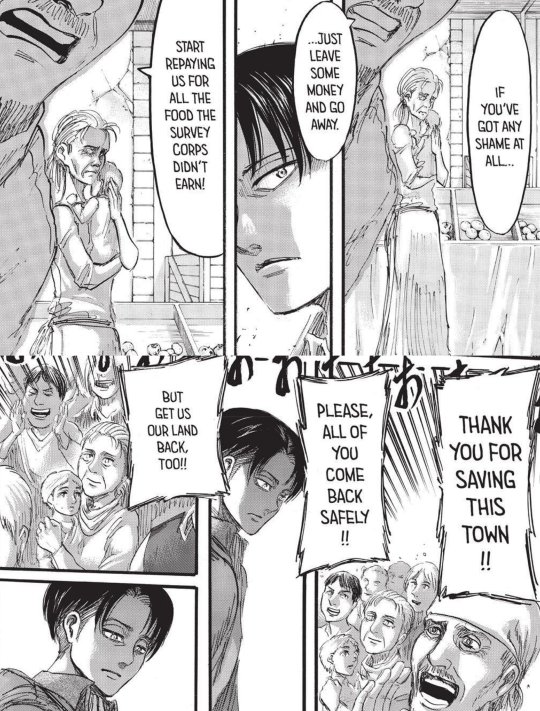
When he later confronts Kenny in the same arc, he specifically questions Kenny regarding the relationship he had with his mother, again indicating that Levi's mother took up significant space in his thoughts.
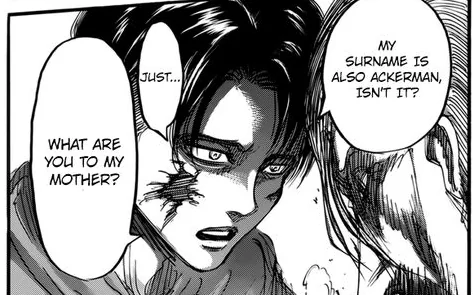
While we know Kuchel chose to keep Levi (rather than abort him), thus indicating Levi was a desired baby, it's evident that Levi's upbringing overall was damaging and distressing due to the severe poverty, food insecurity, and violence he endured as a young child. Accordingly, it's safe to assume that these memories related to his mother were likely to be both unwanted and upsetting.
We also have this panel during the War for Paradis arc, during which Levi ruminates on the deaths of his comrades and the purpose behind having saved Eren's life so many times. His facial expressions are truly crushing and filled with deep despair.
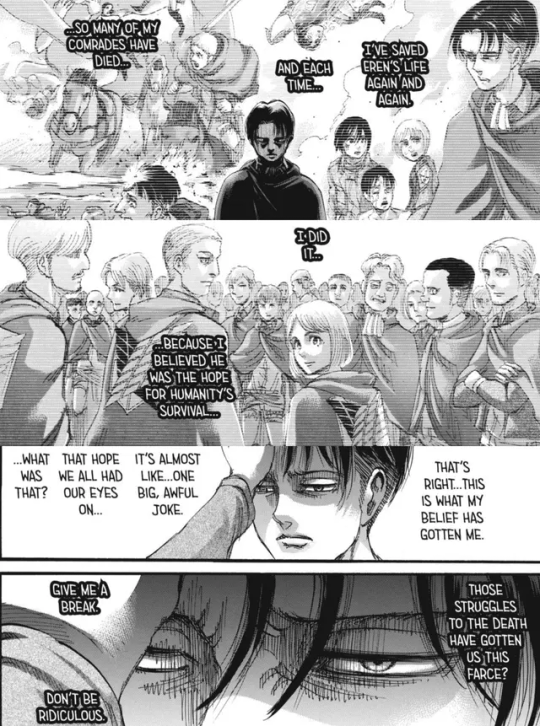
In terms of nightmares, we know that Levi experiences some truly disturbing dreams from the "Smartpass Good Night, Dear and Sweet Dreams Vol. 02" short story, in which he envisions his closest comrades all morphing into a sea of blood on a red carpet. Clearly, the affect of his dream has been influenced by the specter of death constantly looming over him.
Criterion C: avoidance
The full phrasing of this symptom (trauma-related external reminders) is, "Avoidance of or efforts to avoid external reminders (people, places, conversations, activities, objects, situations) that arouse distressing memories, thoughts, or feelings about or closely associated with the traumatic event(s)." Similar to the unwanted upsetting memories symptom under Criterion B, there is not direct canon evidence, but I do believe there is enough to make some inferences.
Primarily, what sticks out to me about Levi is the fact that no one near him seems to have knowledge of his past, which indicates he does not talk about it. When his past is brought up, it's always people who have some direct knowledge about it speaking on it (e.g., Kenny or Erwin). This is shown both directly in canon, such as when Petra speaks to Eren regarding the rumors of Levi's recruitment into the Survey Corps, and in supplemental Smartpass content, like the Close Up interview with Erwin and Levi.
This comes across to me as an effort to avoid conversations, and thus, reminders and memories about the topic.
Criterion D: negative alterations in cognitions and mood
There's quite a lot of evidence for these in canon.
In terms of overly negative thoughts and assumptions about oneself or the world, Levi has plenty. He appears to have the persistent belief that he only exists to be of service and use to others; he views himself as a tool, one which has no value if he is not directly contributing to something. This is exemplified by the following panels:
When Erwin asks Levi if he would be willing to be in charge of keeping the titan serum and determining whom to use it on, Levi answers with, "Why would you bother asking me?" This shows that Levi has no regard for his own personal feelings.
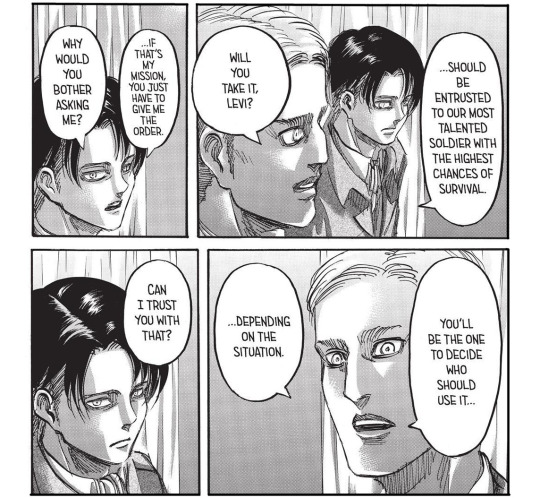
When Erwin and Levi are discussing the plan to take down the Beast Titan during the Reclamation of Wall Maria, Levi expresses his agreement with the plan by remarking that taking down the Beast Titan will act as him "[making] amends for failing to kill that armored brat earlier." This shows that Levi viewed it as his responsibility, and thus, his failure to take down Reiner. He placed an undue burden on himself here, casting blame for outcomes that should not be solely attributed to him.
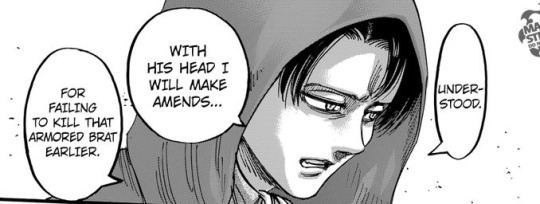
And then there's this panel in the lead-up to the final battle, in which a severely wounded Levi is being reprimanded by Armin for being reckless and not resting, in light of his injuries. Levi responds, "... You want me asleep in bed? You're going to forget I even exist if I rest any longer." Levi suffered truly disabling injuries, and yet, he shows complete disregard for himself—concerned that no one will remember him if he is not actively fighting. This shows a projection of his own lack of self-worth onto how he believes others view him: if he is not useful, then he does not matter. Levi also shows disdain at the concept of resting and having been asleep, as if that's somehow a sign of laziness on his part, which is of course, untrue. No one would have faulted him for resting—he truly needed and deserved to rest.
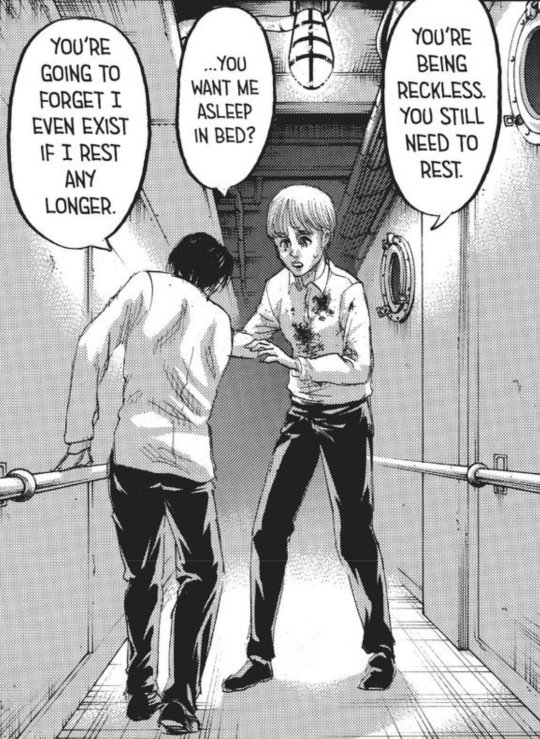
We also know that Levi blamed himself for Kenny leaving him, which can be surmised from interviews with Isayama and the expression on Levi's face when Kenny abandoned him. Levi also asks Kenny why Kenny left him, which shows a certain preoccupation on Levi's part, wherein he worried there must have been something inherently wrong with him to make Kenny leave.
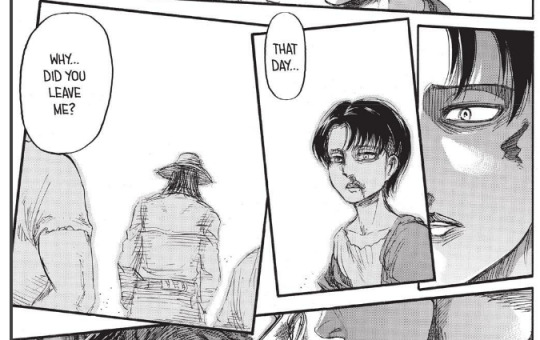
On the topic of Kenny and Levi, Isayama is quoted as saying:
"Levi still had the experience of being separated from Kenny during his childhood. He was constantly troubled by the thought of "Kenny left because I couldn't fulfill his expectations." When the Uprising occurred within the walls, and he confronted Kenny again as an enemy, Levi sought to meet what couldn't be satisfied previously." (x)
Regarding both negative affect and difficulty experiencing positive affect, Levi's expression and mood is frequently shown as depressed. There's a great post by @cosmicjoke on the topic. In terms of the latter, Levi laughs and smiles so infrequently that it's a significant moment at the conclusion of the Uprising arc when he smiles after Historia playfully punches him.

For decreased interest in activities, the full phrasing is, "Markedly diminished interest or participation in significant activities." Levi's character is contrasted with all the other characters in the series in the sense that he has no dreams of his own. Both Armin and Hange have that greater curiosity about the unknowns of the world, represented by the sea and titans; Erwin is similar in that he desired to validate his dad's theories about the outside world and the existence of other humans; Eren craved freedom above all else; etc. Levi, on the other hand, is never shown as having those same dreams and ambitions. Hence, I would say he demonstrates a markedly diminished participation in significant activities, as even though his complete lack of self-interest is immensely admirable, it is also deeply tragic—particularly as dreams and ambitions are often crucial for one's psychological well-being.
And then we also have feeling isolated, for which the full phrasing is, "Feelings of detachment or estrangement from others." On the topic of Levi and relationships, Isayama is quoted as saying, "It’s likely because he is afraid of forming close relationships. Because he exists in a world where one can be eaten by a Titan at any time, he consistently avoids building 'family'-like connections with others." (x)
This manga panel is a good example of how Levi views himself as detached from others. Pay attention to the phrasing: "And I doubt normal people think about these things on a daily basis... So that means I'm abnormal... Probably because I've seen far too many abnormal things."
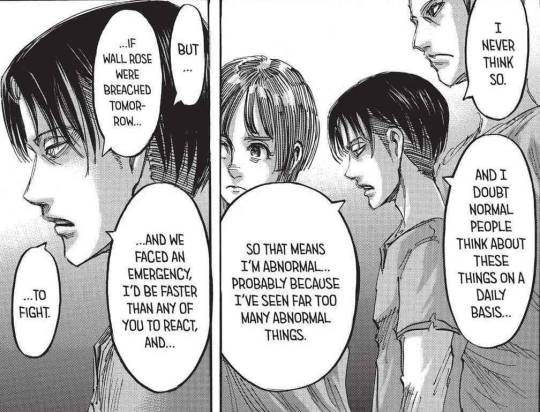
Criterion E: alterations in arousal and reactivity
With all of the above laid out, Criterion E becomes very easy to meet.
For irritability or aggression, this is one of Levi's known character flaws, borne as a result of his upbringing.
For risky or self-destructive behavior, we have clear instances of Levi engaging in battle to the detriment of his physical well-being.
For hypervigilance, the last manga panel I attached provides a good example of that.
For difficulty sleeping, Levi is famously an insomniac, often quoted as getting 2-4 hours of sleep a night.
Criterions F, G, and H: duration, functional significance, and exclusion
Have the duration of Levi's symptoms been greater than one month? Yes.
Do the symptoms result in distress or functional impairment? Yes.
Are the symptoms more attributable to the physiological effects of a substance or another medical condition? No.
Thus, Criterions F, G, and H are met.
Citations
American Psychiatric Association. (2022). Trauma- and stressor-related disorders. In Diagnostic and statistical manual of mental disorders (5th ed., text rev.).
#attack on titan#shingeki no kyojin#levi ackerman#medium: anime/manga#anime: snk#c: levi ackerman#my thoughts#snk meta#I wrote this instead of doing my grad school work#goodness poor Levi#He suffers so much
109 notes
·
View notes
Text
dare i argue...
kenny has a very interesting, consistent morality that isn't all that aberrant compared to most of AoT's main cast.
he is our main source of ackerman lore, whose fallen status within the walls directly telegraphs the position of eldia in the larger world, so on closer inspection, kenny, levi, and mikasa are more than a bit analogous to grisha and the warriors. in kenny's case, i think most of the elder jaegers. hear me out:
my ongoing beef with the uprising arc anime adaptation includes this scene with kenny's grandfather. confoundingly, WIT cut significant length from grandpa's explanation about the ackermans' persecution at the hands of the MPs, but gave kenny a line that... is ghostwritten by zeke jaeger.
in the manga, kenny discouraged kuchel from carrying levi to term for reasons he doesn't verbalize (snk 65)
in the anime (aot 43), my subtitles say "I swear, ain't no point being born in a craphole world like this where there's not a single dream worth pursuing."
the dubbed line is "who'd want to be born into this piece of shit world anyway? there isn't a dream you could have worth suffering through it."
btw i think WIT giving kenny like, 5x more lines with the word "dream" is fucking cheesy and childish; i could see how this mindset is challenged immediately by carla in bystander, but does kenny have to be the one to say it? we get that from historia and alma and ymir already! plenty of characters express thoughts of regretting being born, but this and zeke's are particular to eldians and ackermans, not individuals
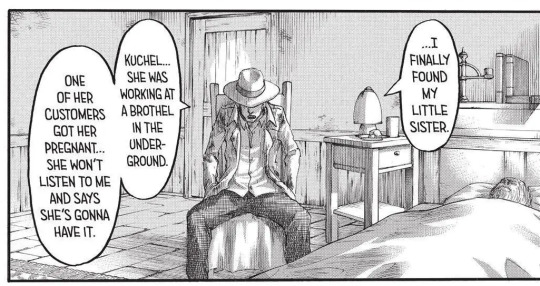

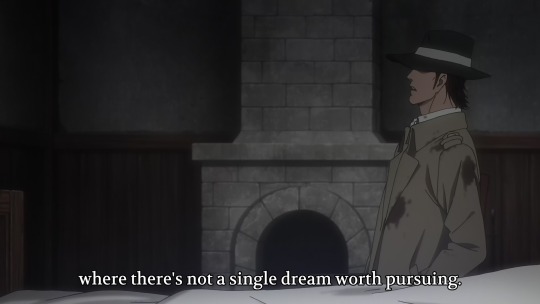
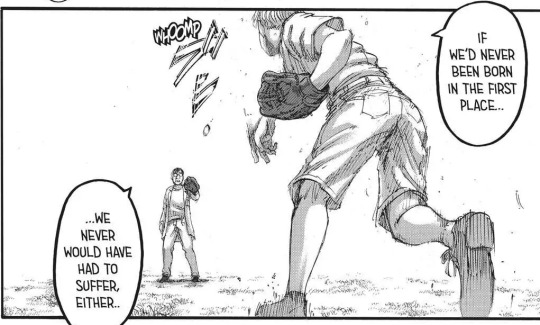
but what grandpa ackerman says about this "deal" between the ackerman patriarch and the crown echoes grisha and zeke's propaganda bedtime stories. the first generation born within the walls hoped that ignorance would spare future ackermans, and eldians left behind when the walls went up hoped compliance would save them from... paradise, conscription, what have you. historical omission and revision: neither fucking worked! that ackerman patriarch died pointlessly, every eldian sacrificed to marley's imperialism from foot soldiers in the trenches to the warriors and proto-warriors, ksaver's generation and older, died pointlessly.
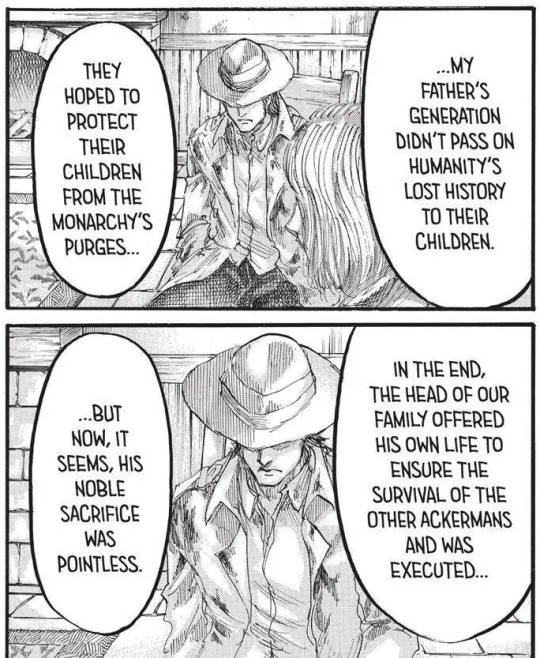

much like the warriors, i don't think any of the above excuses or downplays kenny's wrongdoings, but contextualizes them:
he's a serial killer
as far as we know his Ripping was mostly MPs. as of this scene in ch. 65, the latest were lurking outside a dying old man's home, whether that means they monitored the eldest living ackerman closely, or they were there to jump kenny. point is, killing cops is uhhhhh cool. i don’t care he becomes one himself later. the old 2nd wave feminist adage of “the personal is political” applies to any gender, really, and we should all take police violence against vulnerable populations personally, so whether you frame kenny’s kill count before joining the MPs as self-defense or vengeance, there’s a net positive of fewer MPs terrorizing the streets of the interior and the underground.
he abandoned and/or abused levi
my guess is without his anime-only Zekeism™, kenny’s concern before levi's birth is more specific to kuchel’s circumstances, and also informs his abandonment:
raising a child would make kuchel’s life even more difficult;
the underground and moreover a brothel are no place to raise a child;
as his reaction to levi not knowing his last name goes, living as an ackerman is a curse unto itself (the zeke and ksaver conclusion), even if kenny’s relationship with uri has improved his circumstances;
my most charitable and extracanonical thought for this man is… i wonder what happened to his and kuchel’s own parents. how else do you lose track of your sister like this? did they feel abandoned themselves? did kenny already doubt kuchel would live long or be strong enough to protect a child (maternal mortality, which fellow MP nile dawk brings up in 108)? when he said “i’m not cut out to be some kid’s father,” did he also think that of kuchel? or did he think he also failed as an older brother—kenny and kuchel as grisha and faye...
we only get kenny’s POV of his time with levi, which lasts about five pages of chapter 69. my point is, levi whump revisionism tends to give him annie leonhart's canonical childhood, for which there is no evidence in chapter 69 or in bad boy.
of course, filling the blanks of kenny's pedagogy is grim, and popular fanon isn't unreasonable at all. there's no nonviolent way to teach violence, which kenny calls "the only tool he had" and likely thought of as the only thing he could offer levi. removing levi from the underground didn't seem to cross his mind, either, which could point to a pessimism that people kill people, above and below—the ackermans were wiped out on the surface, after all. but i actually find the understanding of their relationship to the royal family as feudal in the japanese sense helpful here: would bringing him along set levi's path for him, one in service to the reisses? cruel as it was, kenny guaranteed levi's freedom.
he's a cop
okay, this is where the manga gets a little ambiguous/inconsistent with chronology. when kenny gets the anti-personnel squad, he says he’s “never been part of the military before”—he’s actually following levi’s footsteps here, a criminal recruit far outclassing these graduates of the cadet corps. however, to historia, he identifies himself as part of the first interior squad in 845. the fuck?

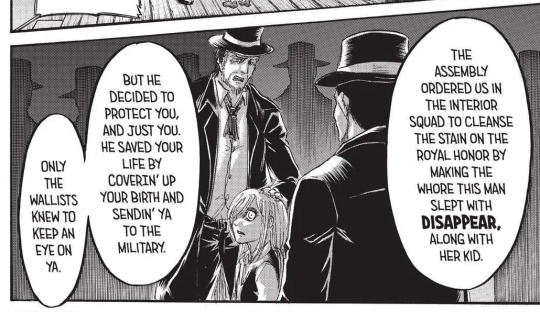
what is more certain is after he meets uri and becomes his bodyguard 😏, he joins this "assembly" or "council" of nobles and wallists. "bodyguard" does not sound like a role in which kenny would wander the walls doing extrajudicial murder like sannes. when levi and hange interrogate sannes, he proudly lists his own resume (snk 55), which includes killing armin’s parents, erwin’s father, and historia’s mother (the 2nd worst thing to be in the walls is blond), so besides alma, kenny doesn't seem to be included in these panels of the first interior squad "bloodying [their] hands" for peace within the walls.
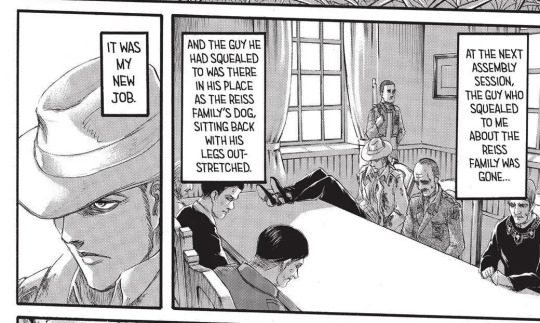
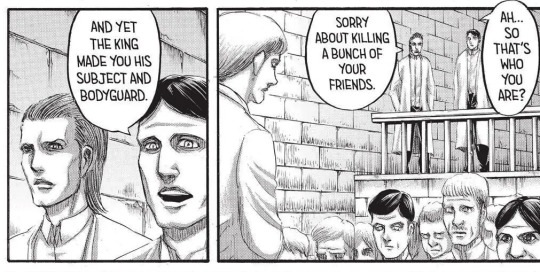
i think a reasonable conclusion is kenny joined the first interior squad after uri's death in 842, and this squad is so elusive as to be legendary to the average MP. there is probably some translation subtlety with "squad" and "section, " so my understanding is the anti-personnel squad is either part of the first interior squad, or an elite, separate but affiliated group much like levi's special operations squad.
i think of kenny in these three years as unmoored much like iseyama describes levi after shiganshina; the main thing guiding him seems to be his disdain for rod reiss, since he has no hard feeling against frieda. dare i say... rod is kenuri's zeke?
besides his worry for kuchel and debatable care for levi, kenny does, actually, express some of the humanitarianism that motivates his nephew, also in chapter 65 and also excluded from the anime adaptation:
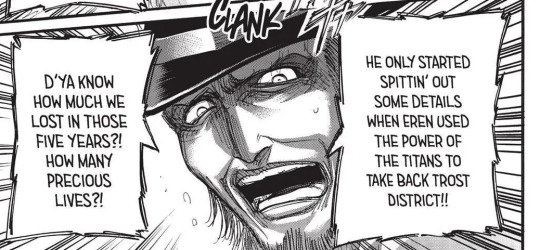
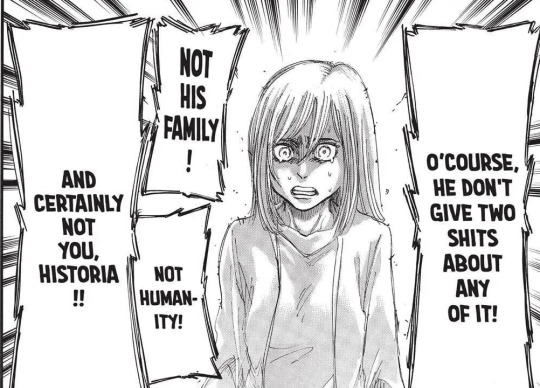
"how much WE lost in those five years?! how many precious lives?!" "he don't give two shits about any of it! not his his family, not humanity, and certainly not you, historia!!
like, HELLO? who is he referring to? the residents of wall maria? the culling that killed armin's grandfather? historia's half-siblings? hell—trost and stohess, mere months ago? i think he's being genuine! this isn't a token, empty phrase, tugging at historia's heartstrings. a killer can value life, i don't think that's that crazy a thing to propose, least of all in attack on titan and least of all in the uprising arc where levi squad kills other humans (also all cops).
kenny's narration in chapter 69 and episode 47 revolves around power. his respect for uri starts from acknowledging him as "the strongest guy around," which echoes over the moment he abandons levi—he's done his level best to teach levi to be the strongest underground, and his philosophy of proving yourself to be the strongest or most powerful doesn't belie a sense of superiority over the weak or any desire to rule; it's the logical conclusion of the oppressed. he thinks of himself as strong, but doesn't call kuchel weak, and his use of "we"—he counts himself part of humanity. his later ambition to steal the founder... makes him more similar to erwin. he just wants the knowledge, the view from up there.

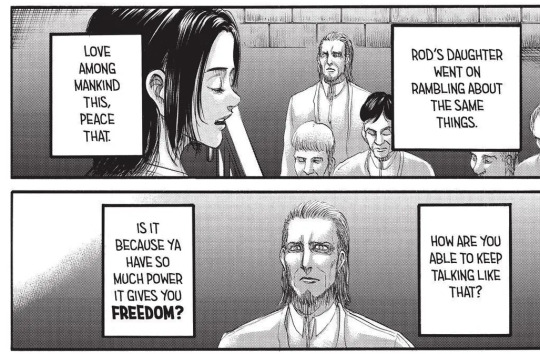
but i think kenny is a little dishonest in chapter 58 before one of levi's coldest "yeah"'s of all time:
i'll kill anyone if that's what it takes to get the job done. ya kill too when it benefits ya, right?
for both men, this object "you" is not themselves as individuals, despite their posturing. it could really, really be humanity, for all three ackermans. mikasa, ten chapters prior:
there are only so many lives i can value, and i decided who those people were six years ago, so you shouldn't try to ask for my pity. because right now, i don't have time to spare, or room in my heart.
and her series-long journey is excavating her heart for humanity. the common fandom complaint that she "only cares about eren" is, to me, similarly reductive as their view of kenny. characters can lie to themselves, or reveal they're more selfless than they thought.
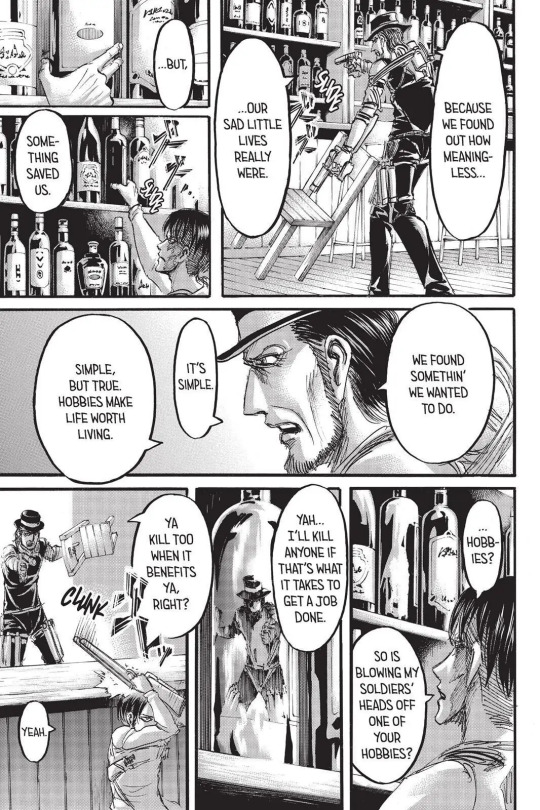
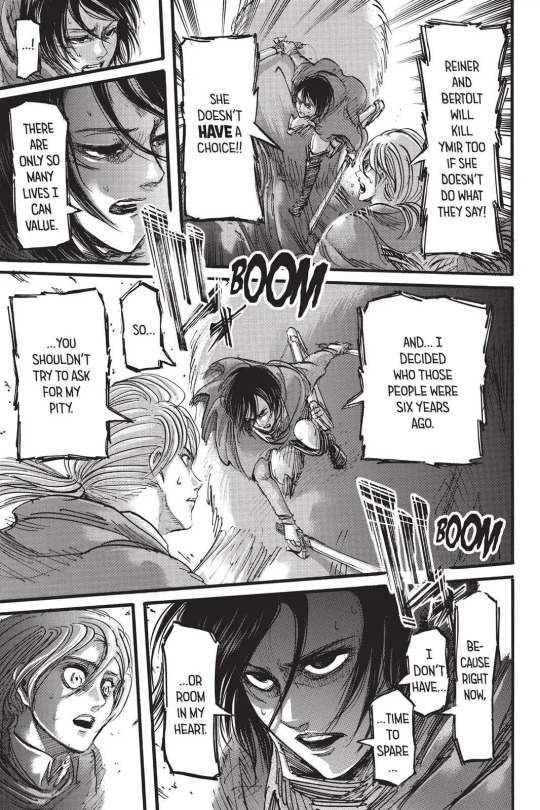
in conclusion:
ACAB
WIT skipped a lot of exposition to animate an extra kenny-levi fight that doesn't even make sense spatially
of course he sucks! and so do the younger ackermans! but they all suck a lot less than they think they do
kenny is also historia's uncle by marriage, in my heart
someone draw him and zeke hanging out
70 notes
·
View notes
Note
I just spend last weekend re-read your AOT metas (they're amazing, Hamliet). What made you love AOT ending despite many people dislike them? Oh and since which moment are you sure that Eren will die in the end (that the series will have bittersweet ending)? For me, I did not see that coming and so surprise (especially the killing blow was by Mikasa)!
Aw, thank you! I think my review of the ending from the day it dropped explains my thoughts well, and I stand by them. The extra pages changed nothing thematically for me, but did give me some extra satisfaction. XD

I honestly knew from the first chapter. I don't intend this to be bragging because I actually think Isayama deserves so much praise for it. He wasn't trying to hide what AoT was.
AoT's first chapter is a masterclass in how to set expectations for a complex series. Set the tone, set the themes, set the characters.
Our opening was someone weeping, and a forlorn letter-- "to you, 2000 years from now." It's a wish to a descendant, clearly spoken by a dead person. To have your main character wake up to that message, and to be crying as this happens--that sets the tone of the series.

At the start of a story, the author has to invite the reader into the experience. The first character is often where the author invites the reader to experience the world they're creating, via said character's perspective. Thus, the author opens the reader's eyes to their world with tears, with a "see you later," and a promise (someone will live on, 2000 years from now). The "see you later" is a promise as well as a farewell.
We are not looking at a cheerful, happy-go-lucky story. We are looking at a poignant story about life and death (as the preceding pages, showing the survey corps battling for their lies, emphasize), even a tragedy...
...But, a tragedy with hope, because the deceased person speaking (whom we now know was Ymir!) knows and cares about someone all those years later. Hence, it's clear that it will be a life-affirming series as well rather than like, grimdark nihilism.
#ask hamliet#attack on titan#shingeki no kyojin#it was a fabulous ending#not perfect but it was immensely satisfying#shingeki no kyoujin#snk meta#aot meta
34 notes
·
View notes
Text
ok just one more thing about color analysis
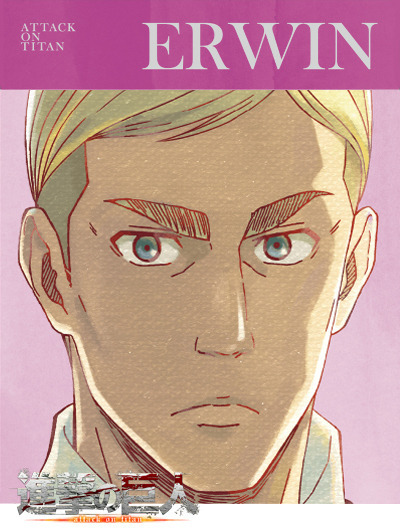
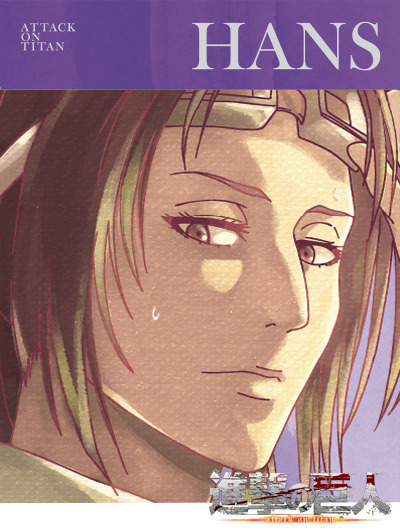
(here is the my full post about the color analysis on other characters including Hange)
This one is specifically about Erwin. What I like about his "official" color is that it's the same as Hange's - purple, mirroring their similar fate of becoming Scouts leader. But there's difference in hue, Hange's looks balanced due to having equal ratio of red and blue whereas Erwin's is magenta and warm-toned due to addition of red. And this addition of red is where the root lies.
Beyond the shared qualities that Erwin and Hange possess and that the color purple symbolizes, such as knowledge, ingenuity, dreams and energy - the very attributes that propelled both into great commanders - the additional touch of red in Erwin's color introduces another layer of connotation to his personality, complementing the classic purple symbolism.
Red symbolizes many things but ones that are relevant to my rant are as follows:
The first and obvious one is bloodshed (cuz blood is also red believe it or not). This connotation ties in with Erwin's treatment of his soldiers and subordinates. Although he cares about them, he doesn't hesitate to sacrifice them for the sake of the mission's success which would often result in lives being lost and blood being spilt.
Going off the blood association, the color red also invokes danger - the feeling that was very evident in each of Erwin's endeavors as his plans would entail endangering the lives of other soldiers.
On the positive note, one of connotations of this color that also pertains to Erwin is passion and driving force. In Erwin's case it mirrors his dream to see what lies beyond the walls, the thing that dictated Erwin's decision.
Another thing worth mentioning is that red is commonly known as the color of revolution - a pretty low hanging fruit for me to point out, considering that Erwin went and did just that in season 3.
All in all, the added hint of red to Erwin's "official" color only underscores the aspects that distinguish him from Hange's approach to leadership. On one hand it's more bloodier and cruel when it comes to soldiers' lives but on the other hand it is more driven and inspiring (not that Hange's isn't it's just their dream doesn't really require an army of soldiers, their dream is more "scientific")
#and this concludes my first and last post about erwin cuz i dont feel qualified enough to talk about him beyond the realm of color symbolism#also erwins been given other colors like blue and gray but shhhh were talking purple only#aot#attack on titan#aot meta#snk#shingeki no kyojin#snk meta#erwin#erwin smith#hange#hange zoe
69 notes
·
View notes
Text
All in all, I wouldn't change anything about the main plot points in snk after the time skip. What I would change, is how those plot points were executed.
For example, I think Eren activating the rumbling is thematically consistent with the story, it's just his motivations that were complete dogshit and made him a ghost of the character he used to be.
I don't know if people are gonna hate me for what I'm about to say next. Last time I was actively in the fandom years ago, people used to get REAL mad for even suggesting what I'm about to say next, but...
I think that it would have been a lot better if it turned out that Eren did the rumbling because he was being manipulated by Ymir.
It would have been poetic irony, the boy who sought freedom, the boy who loved freedom more than anything else, in the end being nothing but a puppet. It would have been so tragically good not to mention actually coherent, and it wouldn't have ruined Eren's character.
Plus, I would have loved to get an actual, solid backstory for Ymir the founder, instead of whatever that rushed shit we got was. I swear the biggest disappointment I got with the series was how much of a letdown Ymir was. This character was spoken about for chapters and chapters, building up expectations that literally led nowhere.
#snk#shingeki no kyojin#attack on titan#eren yeager#eren jaeger#eren snk#ymir fritz#ymir the founder#snk meta#screaming into the void
38 notes
·
View notes
Text
Levi’s Childhood: “Bad Boy”, The Underground, Kuchel, and Kenny—What Are the Implications?
Content Warning: Discussion of rape, sexual abuse, and sex trafficking
“Bad Boy” makes it even more explicitly clear that the Underground was no place for a child. From the “Bad Boy” panels alone, it is evident that Levi likely had constant people preying on him at all times—especially before he awakened his Ackerman powers. All these men Levi encounters here had no issue beating a child to (near) death or selling him into sexual slavery. Similar to the way it is portrayed in the “A Choice with No Regrets” storyline, the Underground is also described by Levi as “hopelessly dirty” with “rotten air”.
It is significant to note here that Levi was well-known for being a prostitute’s son; all of those men were aware of Levi’s relation to Kuchel, even before Levi himself made it clear. They wanted to traffic him for that reason. In terms of speculation, it is very believable and even highly probable that Levi experienced sexual assault and rape before he awakened. Having grown up in a brothel with his mom, and now further seeing how common sex trafficking in the Underground was and also Levi’s infamy for being a prostitute’s son—there is no doubt that Levi was exposed to extreme levels of sexual violence regularly, whether it be him being witness to it, him experiencing the direct threat of it such as in “Bad Boy,” or him experiencing the actual act. The trauma of this is impossible to overstate. It seems the most likely, however, that Levi has had direct personal experience with the act itself, as men would have likely continued visiting “Olympia” after she died (and before Kenny appeared), and upon discovering she was no longer a viable option to have sex with, some of those men would have set their sights on Levi, who was a helpless child in the process of starving to death.
The men in “Bad Boy” spoke about Levi as if he was born strictly to live a life of sexual slavery, referring to him as a “whore’s child” and discussing how they’d be able to profit from making him do the same job as his mother, saying he may have “inherited her talents”. Levi had probably heard this sort of language used in his presence before. As such, it would not be surprising if Levi had learned to expect this sort of treatment, as if he was placed in the world solely to suffer. Levi would have sought out a reason for this—why must he constantly be subjected to suffering? Is it because there is something wrong with him? If that’s the case, what specifically is wrong with him? It is important to consider as well that Levi’s entire sense of identity at this point was wrapped up in being the son of a prostitute and being raised by a serial killer, who may or may not have been his father.
The violence Levi was subjected to in “Bad Boy,” such as having his head repeatedly smashed against the ground with a fist, would have most certainly resulted in his death, or at the very least, permanent brain damage, had Levi’s powers not awakened in that moment. However, what’s notable to me during all of this is the absence of Kenny’s presence. This indicates that Kenny would leave Levi alone in the Underground for significant enough periods of time that Levi still had the opportunity to find himself in situations of extreme danger, situations such that would have resulted in his death. Given what we know about Levi’s childhood from Kenny’s recollection of it in the main series, Kenny would subject Levi to fights against fully grown men in order to develop Levi’s combat skills and likely prompt his awakening. It is also clear in these “Bad Boy” panels that Levi already knew how to fight, given the way he initially tried to protect himself from being beaten by all those men. He was, however, helpless in protecting himself, given the deep disadvantage he had from being a child, as well as being faced against multiple opponents. Levi’s combat skills after his awakening also demonstrated he already had significant training. The responsible thing for an adult in Kenny’s position would have been to, not teach Levi how to fight, but remove him from the environment that necessitated that knowledge in the first place.
Needless to say, this practice was cruel and immensely abusive. The amount of psychological damage and self-worth issues this would undoubtedly cause Levi are immeasurable. It was Kenny’s responsibility to protect Levi’s childhood innocence, but it is because of Kenny’s actions (and inactions) that Levi was placed in a position of having to kill multiple men as a young child. Kenny may have saved Levi from the imminent death of starvation, but his abuse and abandonment ultimately caused Levi more harm than good in the long-run; he taught and exposed Levi to a life of violence. Indeed, Kenny wanted Levi to be a force for violence. That is all he ever modeled for Levi and desired from him, even though he had the capability of sparing Levi from such experiences. However, it speaks to Levi’s innate goodness that he still loved Kenny after all he was made to suffer by him and even forgave Kenny by the end.
The awakening of Levi’s powers demonstrated to Levi the idea that he was an agent of destruction and a monster. Recall back to the moment during the “Uprising” arc when a man accuses Levi of being such and Levi simply responds, “Maybe I am”. Levi’s awakening was described by Levi as a form of dissociation, as if he was not fully aware of what he was doing. Consider his words here: “I didn’t think it was strange that something had happened to me at the time. The pain in my head disappeared and I felt calm, as if my head was submerged in water. And the idea of what to do came to mind. But I just followed the instinct and acted accordingly.” And yet, Levi likely blames himself for the brutality of which he killed his attackers, despite acting in self-defense and having no other recourse. It was an answer to his question: what is wrong with him? He must be a monster. Being forced into such a situation as a child would instill this view in Levi that he was born into his life only to bring suffering to others. That is why he suffers in turn.
This perception of an inner monstrosity in Levi is furthered by what the man in the glasses tells him directly after this: “Stop doing things that will make your mother in heaven sad!” Levi’s impression of Kuchel, his mother, was the one thing that brought him comfort in his life. He remembered her “elegant” posture. With these man’s words, even that one comfort was lost to Levi. Now the thought of his mother would instead be associated with the idea that she would view him as bad—that she would have seen his “murderous” actions and would cast judgment on him. This is completely incorrect, of course. The only reason Levi even awakened his strength was because he was protecting his mom’s image from the cruel words the men were speaking against her. Levi was severely beaten to near death, all because he loved his mom essentially. Think of the tragedy of that; Levi was directly punished for loving someone. This further demonstrates that innate goodness in Levi—how he continues to love and care about others, despite the immense suffering it’s brought him over and over. To further the tragedy of all this, it is evident that Levi still views his mother with fondness, in spite of the belief that she would hate him. Levi purposely seeks out the brothel in which he grew up with her, undoubtedly filled with countless awful and traumatic memories, in order to feel closer to her presence.
After Levi’s awakening, Levi soon after finds himself in yet another fight, and it is this moment that Levi watches as Kenny walks away and abandons him forever. Levi thought Kenny wanted him to become strong. He thought his strength would earn him Kenny’s acceptance, but instead, he was met with his rejection. If Kenny still didn’t love him even after becoming strong, that once again proved to Levi that there was something deeply wrong with him. Similar to the way Levi would come to associate his strength as the thing responsible for making him a “killer” and ruining his mother’s perception of him, Levi would likely form the association that his physical strength led directly to Kenny abandoning him. Moreover, what was the purpose of his strength? Levi did not want to use it to bring suffering to others.
Levi discovered on his own that his strength could be used to help others—to protect. This is incredibly significant because Levi was literally taught the opposite his whole life: that it made him a monster, that its only purpose was for saving himself and bringing death and destruction—he was taught even that that’s something he should desire. Somehow, despite all that, Levi still found a way to use his strength for the benefit of others. Although, this highlights a further tragedy in Levi. As demonstrated earlier, Levi was taught that it was the normal state of the world, the status quo, for him to be abused; he learned that this treatment of him was, not only happening because it was something he was somehow meant for, but also happening because he was some abnormal monster. Levi desiring to use his strength for others does not negate Levi’s own negative perception of himself. All of the events in Levi’s childhood taught Levi that he had no worth, and that is indeed the way we see Levi treat himself throughout the entire series.
Levi never once defends himself against people’s cruel words against him. Think back to the way Mikasa said it was Levi’s fault that they had lost Eren in the “Female Titan” arc directly after Levi had lost his entire squad; think of the way Levi accepts Dieter’s words against him and Erwin about being “devoid of humanity” in the aftermath of the Female Titan’s attack; think of how Levi accepts the negative way the people of Trost and the merchants were speaking against him; and as mentioned earlier, think of the way Levi accepts being called a monster during “Uprising”. Levi directly refers to himself as “abnormal” as well during that same arc. There are countless more examples of this. Levi fights during the Battle of Heaven and Earth, despite being grievously injured already. It is because of this that he ultimately ends up in a wheelchair. Levi fights for other people to the complete detriment of himself. That is pure selflessness. Levi treats himself as completely devoid of worth, despite seeing so much worth in others. As such, Levi dedicates everything he has, even if it would result in severe damage to himself; he views himself as expendable. It is clear too that Levi views himself as unclean from all the blood he has on his hands and all the filth he was surrounded by growing up. It was his “dirty” hands after all that killed all those men and led to his mom’s teacup breaking at the end of "Bad Boy"; a sign of his inner badness.
#levi ackerman#attack on titan#shingeki no kyojin#kuchel ackerman#kenny ackerman#shingeki no kyoujin#aot#snk#levi bad boy#aot bad boy#bad boy#shingeki no kyojin meta#attack on titan meta#snk meta#levi ackerman meta#aot meta#aot.meta#meta.levi#meta.kenny#meta.kuchel#c: levi ackerman#c: kenny ackerman#c: kuchel ackerman#my thoughts
241 notes
·
View notes
Text
An AOT detail I love: In this scene in Season 1 where grief-stricken Mikasa has given up on life after learning of Eren's death, and is seemingly about to let a Titan eat her, Vogel im Käfig plays in the background.


It is an instrumental version, so no lyrics. But in this moment, as the Titan reaches for her and she seems to give in to it, the actual lyrics of the song are:
Wir werden gegen unser Schicksal ankämpfen
Wir dürfen uns nicht in unser Schicksal ergeben
The English translation is:
We will fight against our fate
We must not surrender to our fate
The music itself is telling us what Mikasa is about to do before she even does it. Before she even realizes what she's going to do. In the end she didn't give up. She continued to fight and leap away from the Titan, even instinctively.

The song told us beforehand even if we didn't realize because it's an instrumental version. It's just beautiful how AOT's music choices play a part in the implicit storytelling.


#shingeki no kyojin#attack on titan#aot#snk#mikasa ackerman#mikasa aot#aot meta#snk meta#eren jaeger#eremika
55 notes
·
View notes
Text
What really pisses me off about that guy with glasses is he made Levi doubt Kenny was his father. Even if he supposedly didn't believe it at that time he definitely implanted such sensitive piece of information into a 9-10 year old child. You can clearly see the shock in Levi's reaction once the guy refers to him as "Kenny's bastard child":

I'm pretty sure from that moment on up until his last encounter with Kenny Levi thought he was left all alone as a child in the underground by his father. He probably thought his father didn't love him and left him be without explaining so much as to where his power even originates from. Can you even imagine what could such experience and such set of thoughts possibly do to a little child?
Despite all that it's just so admirable that Levi never failed to value human life. He fought for humanity till the bitter end because as he put it himself he didn't want people to go through the same hell as he did.

This fact alone once again emphasizes the importance of this speech. Levi was ready to play the role of the lunatic so that nobody would have to go through the same hardships as he did, both as a child and as an adult.
#levi ackerman#snk#shingeki no kyojin#attack on titan#aot#snk spoilers#snk levi#levi bad boy#levi aot#levi bad boy spoilers#snk thoughts#snk meta
236 notes
·
View notes
Text
About Levi and Hange's communication skills
A concept I've always wanted to talk about that I haven't really seen many people discuss in the AoT fandom is the communication going on between Levi and Hange whose bond is greatly defined by this concept. They share in my opinion some of the best if not the best communication skills I've ever seen not only in AoT but also in any other form of media I've ever consumed. From the manga evidence I've gathered displaying these characteristics, we can deduce some interesting information about their relationship that I think is worth discussing. I think Levi and Hange are actually closer than what certain people might believe due to these incredible communication skills, and I'll show how communication and closeness affect one another.
A quick heads up, when I say Levi and Hange are close, it's not meant in a romantic way and it will be never be seen as such since neither Levi nor Hange have romantic canon ships in the story. Their closeness to each other will rather be regarded as platonic, almost feeling like a partnership between two friends, and after rereading the manga, I do think Isayama tried to write their bond as a very close partnership rather than some other kind of relationship. Additionally, the fact Levi and Hange are this close doesn't mean that Hange is more important to Levi than other characters with whom he shares a relationship just because he might be closer with them than with others. There's no hierarchy in Levi's heart in regard to his emotional connections with people, meaning that his friendship with Hange means as much to him as his friendships with other characters. Hange brings something in Levi's life other characters don't, but the other way around is also true. I'll only be focusing on the characteristics Hange brings to Levi in this post, but keep in mind that Levi's bonds with others all enrich him in different ways and they're all important to him, and stating otherwise in my opinion is to not understand the fundamentals of Levi's character.
But now back to Levi and Hange specifically, I've seen some people among fandom spaces claim instead that Levi hates Hange or that Levi doesn't care about Hange as much as he cares about other characters, and to that I'd like to counter-argument, explaining why these negative misconceptions can't be further from the truth and how they do a huge disservice to Levi's character in particular.
The first evidence to showcase Levi and Hange's communication skills in a way that's more significant than what we've seen so far happens in chapter 53, Smoke Signal, and is unfortunately a manga-only scene. For a bit of context, this chapter shows the experiments Eren is making in order to improve his hardening skills while the Survey Corps are into hiding, hunted by the Military Police. Then later, after the experimenting session is over, Eren asks about how the experiments went, and we see this interaction occur between Levi and Hange.


There are many details revealed in this scene about Levi's character and how Hange adapts to his personality. So, Levi has a very roundabout way with words when he explains something and no one really seems to understand him. However, Hange is the only person seen to kindly 'translate' what Levi just said so the others present with them in the room can understand better. And in the second panel, Levi acknowledges that Hange understood his words well as he thanks them for their clearer explanation.
This scene shows that Hange needs to have a high level of closeness with Levi in order to be the only person in the room to understand him. Communication is a hard skill to develop with others, therefore this interaction between them can't be explained simply by Hange's intelligence or by the fact that they're good at ‘getting people’. This then means Levi and Hange must communicate extremely well with one another if Hange can even pass as “Levi’s translator” for others. Hange needs to understand Levi's perspective on the world in order to explain his speech to others in a way they can understand as well, which is extremely hard to achieve. The most plausible explanation for this interaction is that Hange and Levi developed a level of communication unlike any other through the years they've known each other, allowing Hange to correctly interpret his words for others who aren't as familiar with his perspective as Hange is. It's possible that in order to reach that, Hange might've been helped by their own innate ability to understand people in general, just like Levi, but the fact remains that communication between them had to be honed and perfected for this scene to happen.
The second evidence that truly solidifies their communication skills happens later on in the manga and anime, and in the manga it happens in chapter 106, Brave Volunteers. For a bit of context, it's a scene that happens during the 4 years time-skip when the Survey Corps have captured a Marleyan ship and have met with Yelena and Onyankopon, the anti-Marleyan volunteers who want to work with Paradis to oppose Marley. Hange and Levi are in a meeting with them to discuss their motivations for going against Marley when this interaction occurs between Levi and Hange.

They are seen understanding each other simply through thoughts (as shown by thought bubbles), which is proof of how strong their communication skills are. They’re literally doing telepathy in a world where such superpower doesn’t exist. They understand each other so well that one glance from the other is all they need in order to communicate together. This level of communication they share is unmatched throughout the series, because in order to do telepathy with someone else, something almost unattainable in real life, the people involved need to have a perfect understanding of the other's mind, the other's inner thoughts, which is something that can be achieved only through getting to know enough that person, and even then it's no easy feat. While it is true that the conversation they've shared wasn't very complicated, it's still surreal that they managed to pull it off so effortlessly. This can only be explained by the numerous years they've spent constantly being at each other's side, and this scene is the literal manifestation of such closeness taking shape in their lives to the point they can understand one another simply through eye contact.
I've seen a few people question the legitimacy of this scene and claim that thought bubbles here mean that they whispered this conversation to each other, however the anime version of this scene is actually what backs up the telepathy theory and solidifies it even further. In season 4, character thoughts are shown through showing the eyes of the character without their lips moving while the voice actor speaks their thoughts in the background. These are two examples of Mikasa and Hange shown when they speak in their minds taken from Season 4 Part 1 Episode 10: A Sound Argument during their meeting with the Azumabito clan.


Back to the telepathy scene, this is how the anime decided to show it from Episode 9: Brave Volunteers.


Only their eyes are shown while their voice actors are speaking with a normal voice in the background. With the anime version, it's very clear to say they spoke through thoughts and not in whispers, which canonically proves they spoke through telepathy in this scene.
With these scenes, we can say that Levi and Hange share incredible communication skills, the best in the whole series, and we've established by now that Hange understands Levi extremely well, but communication has to go both ways: does Levi understand Hange too? The telepathy scene shows that Levi understands Hange as he communicates with them only through eye contact, but another evidence from the manga supports better the idea that Levi also gets Hange when he senses that something is wrong with Hange's demeanour in chapter 52, Krista Lenz. He brings Hange to speak up about what's been bothering them, which is Pastor Nick's death, and then slowly brings back the determination in Hange to fight back knowing full well how much Pastor Nick's death has affected them, which is also one of the reasons why he accepts to torture Pastor Nick's executioner for Hange's sake as seen in his line from chapter 55, Pain: "… That’s probably everything they did to Nick.” This evidence alone shows how much Levi understands Hange too as Levi is a very perceptive character, therefore we can say Levi understands Hange as well as Hange understands him.
These are the manga panels about Levi and Hange's conversation in order from chapter 52.






This is the manga panel of the torture scene from chapter 55.

Now that we've established that Levi and Hange share incredible communication skills and they both understand each other, what does it actually mean for their relationship? To have good communication with someone means that this person must be close to you because you understand the world view of this person. Closeness and communication are interconnected, as communication enhances emotional closeness, which is "the bond that forms through deep feelings of connection, understanding, and vulnerability between partners" (Gardenswartz, 2024) (although this article mainly alludes to romantic bonds, emotional closeness is not inherent to romantic relationships and may very well happen in platonic relationships too). Besides, high levels of closeness do improve one's perception of the other's emotions as this study suggests: "Close friends detected the onset of their partners’ angry and sad expressions earlier than acquaintances. Additionally, close friends were more accurate than acquaintances in identifying angry and sad expressions at the onset, particularly in non-vignette conditions when these expressions were void of context" (Parmley & Zhang, 2014). These findings are consistent with my own arguments about how Hange and Levi correctly perceiving the other's viewpoint and emotions makes them closer to one another.
I also do want to touch up on something I don't see many people discuss, but I genuinely think the events that happened in Shiganshina, namely Erwin's and the rest of the Survey Corps recruits and veterans' deaths, made Levi and Hange grow even closer than what they were before due to shared trauma. For some reason, bonding over trauma isn't regarded highly among fandoms, however it doesn't make the bond less valid because it happened under a traumatic event. Some people like to disregard the fact Levi and Hange remained the last two veterans alive and lost their common friend as if such experiences only affected them individually and not together, but these experiences are important to their bond and it wouldn't be far-fetched to say they both only grew closer from them despite the griefs they might have felt from such harrowing losses. This concept of shared trauma bringing people closer together might look obvious, but science supports that concept as well, as seen by the findings of this particular study: "Sharing painful experiences with other people, compared with a no-pain control treatment, promoted trusting interpersonal relationships by increasing perceived bonding among strangers" (Bastian, Jetten, & Ferris, 2014). An example from the manga somewhat supporting this theory could be Levi and Hange's telepathic discussion which happens years after the tragic events of Shiganshina, showcasing how close they've become to succeed at communicating only with their eyes.
Therefore, understanding Levi in the way Hange does shows they're humanizing Levi and see him for the person he is rather than the tool or weapon many other characters see him for, himself included. Hange took the time to understand Levi's perspective, his values and motivations which shows they care a lot about him. I would even argue that the main theme of Levi and Hange's relationship is this constant care they're mutually giving to each other throughout the series, and why Hange had to be the one to find a gravely injured Levi after his encounter with Zeke in chapter 115, Support, and then nurse him back to a relatively stable state. I believe that scene is the culmination of their theme, and although we could speculate on what other characters would've done for Levi if they were in Hange's position or whether Hange would've saved another soldier the way they saved Levi (they would've since Hange is a caring person), the fact remains that Hange had to be the person to find Levi in that critical state to make sense narratively speaking, as mutual care is all about the theme of their relationship.
To show how Hange's care towards Levi is showcased throughout the manga, I will include an example occurring before chapter 115 to further prove how this theme has been explored throughout the manga. It didn't magically start after Hange found an injured Levi. There are many instances when Hange is seen caring for Levi, but I'll be using an example directly showing Hange's worry about Levi and his squad's wellbeing taken from chapter 57, Kenny the Ripper. This happens in the Uprising arc when the Military Police is out hunting the Survey Corps, and we see a visibly upset Hange asking Erwin about Levi's squad's whereabouts.

The reason I'm showing more Hange's care towards Levi than Levi's care towards Hange is because Levi cares about everyone, and Hange is obviously included in that everyone. Levi is shown caring more about people than people are really shown caring back for Levi in the same way that he cares about them, so this is why this theme of mutual care between each other is particularly more important to show on Hange's side than on Levi's side. However, to prove how the manga is portraying his care for Hange, I'll use again one example among many taken from chapter 79, Perfect Game, during the Shiganshina arc where we see Levi muse about Hange and the others' whereabouts after Bertolt's explosion. He's even considering meeting with Hange's squad to check up on them when Zeke starts throwing his rocks at the Survey Corps. Similarly to Hange's worry about his wellbeing, we're seeing here Levi's own worry about Hange and their squad's wellbeing clearly displayed in the manga.

This brings me to the misconception still circulating in certain parts of the AoT fandom that Levi hates Hange, and how we can see it has been thoroughly debunked by the closeness they share together. Even so, I'll still analyze it in detail for the remaining sceptical people who stumbled on this post.
First, let's start with the fundamental question: does Levi hate Hange? The arguments I've seen for this claim are that Levi is rude towards Hange as he calls them by harsh nicknames, which can be debated as to how "mean" they actually are (his most used nickname for Hange is "four-eyes", so I'll let you be the judge of how "insulting" this nickname is) and that such a "clean freak" like him (in Hange's words from chapter 9.5, Side Story: Captain Levi) could never tolerate someone like Hange who isn't too keen on bath time. These arguments in my opinion are rather shallow as to why Levi could even hate someone because they "don't bathe as often as he would like", and it's a simplistic view of Levi's character. Levi would never hate someone for not sharing a similar lifestyle as him, especially him, the most non-judgemental character of the series. The only person we can clearly state he hates is Zeke, and that's due to how opposite Zeke is in theming to Levi. Zeke is Levi's narrative foil in where Levi values life and fights as hard as he can to not see people die anymore, Zeke has no remorse using people for his schemes and killing them in the process, seeing their deaths as justified for a greater cause. I would even argue that had Zeke shown some kind of remorse or grief to what he has done, anything that would have redeemed Zeke a bit in Levi's eyes, Levi wouldn't hate him as much as he currently does. This is why Levi is more accepting of the warriors like Reiner or Annie because they do feel grief and remorse for what they've done to the people of Paradis unlike Zeke. But we cannot compare Zeke to Hange, except maybe their intellect and the fact they both wear glasses, but the similarities end there. Hange is much closer to Levi in ideals than they are to Zeke. Simply that Hange is the one to have brought the Alliance together to stop Eren's genocide pretty much shows why Levi even accepted to be part of the Alliance as well, which puts Hange at a complete opposite pole from Zeke.
So then, it would make no sense for Levi to now become judgemental with Hange on the basis of such a trivial disagreement on their bathing routines. Besides, this bathing argument is nowhere to be found in the manga. It comes from side material that is sometimes highly exaggerated for jokes (like in Junior High for example). Therefore, I don't think these types of arguments should be taken seriously, and especially not to prove such an important claim that can unfortunately affect the way people in this fandom see Levi and Hange's bond.
Going back to the rather "rude" name-calling of Levi, this doesn't show Levi hates Hange or anyone for that matter, as Hange isn't the only one on the other side of his rude remarks. The majority of the AoT cast has been subjected to some of his name-callings, but that doesn't mean by any means that he is hateful towards these characters. It's his blunt way to communicate with others, which probably comes from his harsh upbringing, and this is something Hange understands about Levi as they have never been offended by his rude remarks and have instead played along with him, creating a certain kind of bantering between the two as we can see in this example from chapter 26, The Easy Path:

We see how Hange has no problems humouring Levi with their answer even if Levi's comment could be seen as unprofessional and borderline disrespectful by our rather polite society. So then again, on what grounds could Levi even hate Hange, the person who understands him the most in the story? The claim then falls flat, as it would be illogical to say Levi hates the person who understands his world view and can communicate with him the best.
Now, on to another misconception closely linked to the first one, namely that Levi cares more about other characters than Hange, or that his bond with Hange is not as special or as important as his bonds with other characters in the story, or even that Hange isn't crucial to Levi's story as they could've been erased from his story and it wouldn't have changed anything in Levi's story (and if some people believe these comments are too exaggerated, these are real comments I've received under a discussion thread, so no, these ideas unfortunately lurk in this fandom). So, we've already established how close Levi and Hange are due to their communication skills and shared trauma with different examples taken from the manga, and how the theme of their bond is mutual care. Why would their closeness and theme be regarded by the fandom as less important than any other themes from AoT, and more importantly, why would Levi in particular care less about his bond with Hange when Hange is the closest to him?
I've already expressed how Levi views all of his relationships equally in terms of emotional impact, and even more so, his care for others is such that he'll care about strangers as much as he cares about his own friends or family. I do think this is a difficult concept to grasp for some people in this fandom as we as human beings all prioritize our relationships with our family and friends rather than the ones we might have with acquaintances or strangers, and this is a totally normal behaviour to have. However, such behaviour doesn't apply to Levi as he is quite literally considered the ideal person, the archetype we should strive to reach as readers or anime viewers learning about his story. And so, to claim that Levi might have "favourites" in his life is completely inconsistent with Levi's own personal theme as a character, which is the value of life. What messages would a character representing such an important concept, even more so nowadays in our troubled times when clearly, the rights of certain people are seen as more valuable than the rights of others, send if he cared more about certain characters than others? It would make no sense thematically speaking, and even worse, it would mean that indeed, some characters' lives are actually more valuable than others, which would only shatter his theme. When I say that no character's life is more valuable to Levi, it's never in relation to the ranking of said character, because by that idea, then of course Erwin as commander is more valuable than anyone from the Survey Corps when Erwin was commander, but more in relation to the intrinsic aspect of life and how that character's life affects Levi, and on that level, the emotional importance level, everyone is equally important to Levi, no exceptions. This is why stating otherwise about Levi and his bond with Hange does a huge disservice to Levi's own character as it destroys the fundamentals of his theme in canon.
If someone isn't interested in such theme and prefers a fanon version of Levi's character, that's totally valid too and I'm not here discussing how people should see Levi fanonically as we all have different headcanons and ideas about him that are all worth exploring in fanon territory, but I do think it's important to make the difference between what themes Levi actually represents in AoT and ideas about him that are fanon, which is something some parts of this fandom struggle to make sometimes. It's okay if some people aren't interested by Levi's incredible empathy and selflessness and would rather see him care the most about their favourite character, but these people should keep in mind this isn't how Levi operates in canon, and therefore claims like Levi doesn't care as much about other characters that aren't their favourites, like Hange for instance that unfortunately receives a lot of these bad takes, should not really circulate among the fandom in the first place. These misconceptions lurk in the fandom because some people genuinely believe Levi canonically has favourites, and that's what I'm trying to debunk with this post that has now become an analysis about Levi's character too lolol. But basically, by saying he doesn't care as much about Hange as other characters paints an image of Levi that's inconsistent with the actions he's taking in canon, and it confuses the fandom as to whether these claims are actually correct or false.
Just to give an example of this doubt that's cast in the fandom about Levi, the main reasons I've seen for people to dislike Levi's character are rooted in this false narrative that Levi is obsessed with the promise to kill Zeke, and by some sort of extension to be obsessed with Erwin (as if the promise was just about Erwin, but I won't start on this topic for this post), which is why they don't like Levi. But what these people actually don't like is this fanon interpretation of Levi, which many other Levi fans and myself don't like either, and that's where the doubt is cast since many Levi haters really believe this is how Levi acts in canon, that he really just cares about Erwin or cares more about him than anyone else (and yes, these two misconceptions are part of the same coin, they're not different) because they've seen this take circulate in the fandom presented as a canon fact, so of course it can be difficult to spot the mistake. Therefore, it disrupts Levi's canon self by stating such misconceptions, going as far as making some people believe these misconceptions to be true. They're not seen how they should actually be seen, as some fanon interpretations that a portion of the AoT fandom has about Levi that you may like or not, this is a personal preference, but regardless of whether these fanon interpretations are liked or not, they're canonically incorrect.
To sum everything up, Levi and Hange are both incredible characters individually and together, and what makes them really strong is this closeness they share which results into mutual care and why such close scenes between each other like in chapter 115 or in chapter 126, Pride, where we see Hange physically take care of a wounded Levi in the forest, even exist in both the manga and in the anime. I also think it's interesting to see how the two "abnormals" of the story seem to be the ones to understand each other the most, which is definitely a very fitting theme for them. While I know it's impossible to stop established popular misconceptions from spreading in this fandom, I hope at least that this post shed a bit of light on Levi and Hange's bond and maybe more people will be discouraged to state Levi hates Hange or that Levi cares more about certain characters than others after stumbling on this post.
46 notes
·
View notes
Text
what's Yelena's deal?
i mean her purpose in the story. i see that she wanted to see Eren as special, which could undo development he had in s3, but Eren didn't buy into her idea of him so i don't see the point. was it to just make us believe that he regressed in this way and that's the reason for his actions?
wait no it was pretty visible that he didn't really connect with Yelena, was it to show that he's still disillusioned by the idea of being special. she reminds me of Mikasa in this sense, or more accurately i feel she'd remind Eren of her - on both sides there's someone who believes he's special and unquestionable, and he knows that they're not actually seeing him since he doesn't deserve it (becoming less true for Mikasa at this point, but Eren's not really privy to that). also Yelena wants him to be both special and basically a god, and he is going to take role of a god for a bit, even as a very flawed person.
this doesn't satisfy me as an answer at all btw
there's of course also the point that aot sprinkles in all kinds of characters with different viewpoints formed in reaction to the world they live in to just show them to us, and in that sense i am pretty satisfied with Yelena as a character. it is pretty interesting that she wants to have this religious reverence seemingly for the sake of it. she probably also went against Marley not because of any real moral opposition to them but because she wanted to have a cause, like Pieck implied. ohhhh wait that's like Eren. also never satisfied with life but she did live in a time where she's not in any existential threat so she manufactured a conflict to participate in. ofc it could be that she actually does have a reason to dislike Marley, and it would explain why her conflict of choice isn't to fight for Marley. wait but i kinda like the idea that she was really into saving the world by defeating the island devils and preventing the rumbling or whatever the fuck, but then she saw Zeke
#ofc in general eren sees yelena and mikasa differently i'm just comparing them in this sense#also you could add zeke as someone who sees eren as special to him but it's different. eren's rejection of that has a different vibe to me#now i'm so curious what yelena's upbringing was like#yelena aot#yelena snk#aot#aot meta#snk meta#attack on titan#eren jaeger#eren yeager#snk#my posts
11 notes
·
View notes
Text
sole salvation: zeke jaeger, messiah claimant
this is so long it has a table of contents, and prompted by an ask from @oxygenbefore1775:
salvation and atonement
recapitulation
genealogy
the paths as wilderness
biblical fiction
all the english bible citations are from the NRSVCE, i reference the gospel of john just once because it sucks, this is barely proofread and about ~4k. two shorter posts that might be of interest:
the founder ymir eve-mary replacement theology run
krista/christa
none of this is arguing iseyama consciously made any allusions!! this is just comparative reading
1. salvation and atonement
i looked up the japanese title for snk 114, "唯一の救い," mostly for the second part. "唯一" is kind of obviously "sole" or "only" (if i know any CJK characters it's number radicals), but i wondered about the nuances of "salvation" because of the association i have for it below. this had me running to good ol' biblegateway.com, whose only japanese bible translation is the from the heavily paraphrased/colloquial Living Bible. a search of "救い" lands us in exodus, isaiah, and my second-favorite gospel, luke.
you guessed it: it's part of the word choice for "messiah." section titles in bible translations are editorialization, really, but the beginning of the nativity story in matthew is headed
約束 さ れて いた 救い主 promise (...tense stuff idk) savior
救 = rescue, aid, salvation; 主 = host, leader, lord
in the hebrew bible context of exodus, 救い most often refers to god delivering the israelites from egypt through moses, while isaiah is christians' favorite prophet for all his shit cited as prophesying the messiah. the title "christus" is latinized from the earliest greek translation of the bible from hebrew, which used "christos" for "messiah." kings good and bad were anointed with oil (chrism) at the start of their reign, so "anointed one," "messiah," and "Christ" really just meant a monarch. quoting some old testament pseudepigrapha (psalms of solomon 17:23-24), the messiah was understood in second temple judaism as a future davidic king expected to "thrust out sinners from the inheritance / to crush all their substance with a rod of iron / to destroy the lawless nations with the word of his mouth." (rod reiss, zeke as marley's spear, the scream, etc)
now for the "sole" bit. i am cursed to read the kodansha USA title "sole salvation" with the connotation of the solae of the protestant reformation, which are 2-5 doctrines articulated by various reformers but not necessarily codified (or creed-ified, as it were), uh, in protest of early modern catholicism. theological authority comes sola scriptura (not the pope), justification comes sola fide (not by following rules the best), and salvation is available to all sola gratia (through god's grace, not individual merit/how many indulgences you can afford).
how we apply all this to zeke:
what is wild about christianity and islam after it is "humanity"'s fall from grace and the promise of a messiah to remedy it were initially about just one people. AoT's dramatic irony has the paradisians refer to themselves as the whole of humanity until grisha's basement, so jaegerist ethnonationalism is, really, in keeping with the prehistoric tribalism detailed in the history books of the hebrew bible. when the israelites encounter egyptians and semitic peoples of canaan and babylon, they know them as pagans, and proselytization is not on their minds at all, nor these other peoples' relation or lack thereof to adam and original sin. with zeke, we see this idea of salvation and its scale and recipients flipped between grisha and ksaver: grisha promises the restorationists that zeke will save eldia, while ksaver and zeke swear to save the world from titans with eldia as the sacrifice.

the lack of consensus of how to "save" eldia mirrors the hairsplitting of soteriology into what modern commenters call theories of atonement. there are many, but the only ones i'll mention are
substitutionary theory: the vague but broadly understood starting point that jesus died for humanity, and most subsequent theories hammer out the details. with this you'll often see writing connecting it to the story of abraham and isaac, and a classic work is derrida's the gift of death chapter 3, but i have to say if this story echoes for anyone in AoT, it is tom ksaver and not just because of the ram.
ransom theory: humanity has been satan's hostage ever since the garden of eden, so jesus was born and raised, incarnated as human by god, to be the perfect sacrifice to buy back our freedom. this is weird because it calls into question god's omnipotence: why respect satan as a debt collector?
satisfaction theory: jesus' sacrifice is more about ethics and respect in that his death is the "minimum" price for our sins, but he goes above and beyond by walking willingly through the exact cavalcade of physical torture that was the passion, which "satisfied" god, working from a classical/medieval fixation on honor and dishonor.
penal (not penile) substitution theory: god cannot forgive sin willy nilly, so jesus bore god's punishment for us. this is lutheran, and if you read martin luther's diaries from when he was an augustinian, this man just wanted a morally perfect Dom. libs and catholics don't like this because it makes god look bad. s/o my kenny post where i put grandpas ackerman and jaeger side by side with a bit of penal substitution, but it also makes me think of grisha (below)
and my favorite, recapitulation theory, which is simply the most literary way to read the gospels: christ's life, not just death, are a do-over of adam's. he succeeds where adam failed, perfectly inverting everything about the first man: he was born of a woman (the cause of adam's fall 🙄) but chaste himself (allegedly), he's tempted directly by the devil and resists, and in death the piercing of his side by a roman centurion echoes that eve was made from adam's rib. it's the root of the idea of jesus and mary as the "new" adam and eve that i dip into in the krista post—antisemitic supercessionism is a later addition. mary "recapitulates" eve by obeying god, not satan, etc.

i didn't do that comprehensive a skim, but grisha and zeke seem to be the only ones who use "salvation" language, while karina braun uses "atone" in snk 94. "atonement" has one of the silliest etymologies of all time: at + onement, unification, when two become one. so framing the crucifixion as "atonement," and referring to mysticism as self-effacement, jesus' death is supposed to reconcile man with god, like we were divorced. its more pedestrian, legal definition is for reparations and such, but i don't think the soteriological version can describe marley and eldia at all. it's not just penal, but penitential (sacramental) semantics on kodansha USA's part. i might go pester @tsuki-no-ura for a direct translation later. but the jesus-est and adam-est thing about zeke, to me, is physical at-onement when ymir fuses his body into the founder, or as zeke says to armin in snk 137, "did ymir eat you, too?" so the death of jesus' earthly body is a horror story if you aren't trinitarian: he is subsumed into god, made indistinct.

2. recapitulation
recapitulation is a useful idea for FOUR AoT characters: zeke, historia, eren, and mikasa. i really think the figures that do the most to "recapitulate" the eldian creation myth are mikasa and historia, though:
historia: have already said my bit! she's the anti-mary, snk 65 has the juiciest theological language of all. see my second favorite gospel luke. she disobeys where ymir's daughters didn't: she says hell no, she kills her dad. she's my hero.
mikasa: eren and armin's conversation about mikasa and ymir more casts ymir as a god with mysterious motivations, so i'd say "whatever mikasa did" gives us a more medieval "satisfaction" model of pacifying her rage
eren: the whole metaphor on humanity penned in like livestock, ymir's leaving the gate open for the pigs. eren's defence of historia, even from her own self-sacrifice in volunteering to inherit the beast, also makes him an anti-daughter of ymir.
zeke: has all of the prologue and expectation to make him seem like a savior. if he recapitulates any part of "from you, 20,000 years ago," he starts out as fritz by attempting to order ymir with his royal blood, but ends up just as bound as her. there's a screencap we've all seen overlaying the storybook illustration of "ymir" and "the devil of all earth" with eren, zeke, and ymir in the paths. i have feminist tbh satanist thoughts on the nature of knowledge and forbidden fruit that i slghtly get into in that krista/christa post
this is the point where it's important for me to say this is an atheist post and blog, and jesus of nazareth was one of like half a dozen messiah claimants knocking around judaea at the time, including his own cousin john the baptist. the first coming of the messiah was a nearly as absurd a prospect to jews in the late roman empire as the second coming of jesus is to us, so "claimant" doesn't even mean they said so themselves. some were preachers whose followers got a little too hype, or just actual con artists. but! zeke does have a lot more christian echoes going for him beyond the exact function of his death.
in the original question mae asked about zeke in either marian or christian terms, so i gotta say that jesus was also human and subordinated to god's will, in a similar position to mary, as was adam. adam's rib symbolism is so erotic and penetrative and all i think about when titans in AoT are constructed spinal cord first. to me everything about titan shifters is a feminist issue of bodily autonomy regardless of gender, and the power of the founder to "rewrite" eldian biology is the most god-like, terrifying, violating thing about it. this is where a lot of more progressive christian theologians struggle, too, with the question of how is god, in all his power and goodness, still permissive of suffering? or is it that god is not in fact powerful, simply all-knowing? and is that worth jack shit? which is the issue of the royal family keeping the founder after the walls went up.
and we leave this section with the jesussy, or more specifically "the holy lance" that made jesus' side wound. but i think levi went for, idk, his appendix? good enough.



3. geneaology
the gospels of luke and matthew start with lengthy and conflicting geneaologies in support of the claim that jesus of nazareth is of the davidic line through the tribe of judah, but matthew's is patrilineal from abraham through joseph, while luke's is surgically imprecise about jesus' father and thus is often argued to be jesus's geneaology through mary backwards to adam, supported by luke being the gospel to feature women the most prominently. not knowing those intricacies or how legal adoption worked in 1st century judaea, you can say that mary is royalty and joseph is just some guy, ben david or not, because he famously did not contribute sperm. looking at zeke, grisha is just some guy, and dina's blood is the whole justification for zeke's suffering. had she not married grisha, she still would be affiliated with the restorationists, and whatever other child she had would be sacrificed much the same. this supposes that jesus of nazareth was just some guy himself, a typical second temple jewish teacher whose followers were especially rowdy; whether god is real or incarnated himself as human is inconsequential when mary is directly descended from david.
but joseph Does matter from a purely pragmatic point of view of protecting and providing for mary and jesus, from keeping his troth with a pregnant teenager he'd probably never met before to the matthew account of fleeing with them to egypt to hide from herod, and in christian ethics through shit like the Feast of the Holy Family, which replaced the much cooler Feast of the Circumcision.
point is, jesus had two dads! joseph is generally understood as a dead during the time of jesus' three-year ministry, but any time jesus refers to his father he does not mean joseph. like ever. zeke nation knows better than i how often zeke discusses grisha, but in my recollection he calls him his full name or says "your father" if talking to eren. in my subtitles for the above panel re: the second paradis mission he says something like "as the former son of the terrorist grisha jaeger."

but to be clear joseph of nazareth is comparatively a non-person. it's reasonable to think he taught jesus his trade of carpentry, though, and two of the greatest songs of all time play with that, along with that tumblrina poem that goes around here frequently.
beyond daddy issues, protestants like this binary of "high" versus "low" christology to discuss jesus as god and jesus as man, though the exact meaning of either varies and frankly i question the historical accuracy of using either to describe ancient/antique christological debates. the way the liberal protestants at the seminary i dropped out of tended to use it is basically sorting jesus's qualities and behaviors in the gospels as divine or human. divine activities = miracles, prophecy, rising from the dead; human activities = flipping tables, being rude to his mom, getting hangry. now these mostly look like venial sins, to err is human et cetera, but the fig tree story is one of the silliest little humanizing details about him, to me tantamount to zeke having a cat's tongue. zeke's whole problem is he holds himself to an extrahuman (not divine, no, since he probably would go with demonic) standard while forgetting what makes him human. ironically, zeke rejects his inhumane father to claim his very human mentor as family, but ultimately half-lives his own life holding himself to or counter their visions of salvation.
the other bit of jesus' family worth connecting to zeke is his cousin john the baptist. but he more belongs to the next section.
4. the paths as wilderness
the torah or pentateuch, the first five books of the hebrew bible, have 99 uses of "wilderness" in the NRSV, and it pops up about 150 more times throughout the prophetic books. of all AoT's hamhanded judaic imagery, i think the paths actually get at something theological as opposed to earthly/fixated on eldia as a persecuted people. the wilderness is a testing ground and a kind of punishment itself, especially in genesis and exodus, for prehistoric figures like hagar, moses, jacob, david, and of course the israelites once they left egypt, wandering for 40 years. they starve and god saves them with manna; left unattended for two seconds they turn to idolatry; and they of course conquer various tribal people of canaan, including the philistines (root of palestine). after that, "wilderness" is much more metaphorical, referring poetically to estrangement between god and his people, the israelites exiled in the babylonian captivity, the destructon of solomon's temple, etc.
but there's one literal wilderness in the gospels. jesus' cousin john the baptist is introduced by a quotation:
In those days John the Baptist appeared in the wilderness of Judea, proclaiming, "Repent, for the kingdom of heaven has come near." This is the one of whom the prophet Isaiah spoke when he said, "The voice of one crying out in the wilderness: 'Prepare the way of the Lord, make his paths straight.'" (Mt 3:1-3)
john the baptist is jesus' maternal cousin who he likely only meets once in adulthood, and i am too pedantic not to explain that baptism, or ritual bathing, is not a christian invention. he hung out around the river jordan wearing a hair shirt and preaching and dunking people in a kind of open-air mikveh. jesus visits him to get dunked as he starts his three-year ministry that ends with his death, but before they meet there are already whispers that john the baptist is the messiah. herod antipas, a roman tetrarch, had john beheaded shortly after this at the request of his stepdaughter, so when herod hears stories of jesus' ministry and miracles he dreads that he's john the baptist returned to life.

one could say the fateful meeting of john and jesus is the turning point for the birth of christianity, like the jaeger brothers in shiganshina, in part because the gospels have john insist up and down he himself is not the messiah, he's just preparing the way for him. this kind of makes him look like a bigger loser than he was; contemporary jewish historians of the time say he had a following to rival or even larger than his cousin's.
but right after his baptism, jesus fasts in the wilderness for 40 days, where the devil tempts him. it's the most detailed in luke 4 and matthew 4. jesus resists like a champ, but returning to "low" christology and questioning what actually makes "perfection:" after three years of preaching in galilee, jesus' resolve wavers, and the "willingness" of his sacrifice is 2,000-year-old point of debate. two moments in the gospels that show he fears his death are praying between the last supper but before his arrest, and just as he dies on the cross. gethsemane, or the mount of olives:
And going a little farther, he threw himself on the ground and prayed, "My Father, if it is possible, let this cup pass from me; yet not what I want but what you want." (Mt 26:39)
And going a little farther, he threw himself on the ground and prayed that, if it were possible, the hour might pass from him. He said, "Abba, Father, for you all things are possible; remove this cup from me; yet, not what I want, but what you want." (Mk 14:35-36)
Then he withdrew from [the disciples] about a stone’s throw, knelt down, and prayed, "Father, if you are willing, remove this cup from me; yet, not my will but yours be done." (Lk 22:41-42)
and as he dies in matthew and mark, he quotes psalm 22, "eli, eli, lema sebachthani?" or "my god, my god, why have you forsaken me?" he shows resolve and despair, i think so very like zeke. his line in snk 114 of "are you watching, mr. ksaver?" makes me think jesus' relationship to god was similarly distant, and three years of ministry have to have changed jesus as much as oh, 13 years of being a human weapon changed zeke. ymir "tests" both jaeger brothers in the paths, so i bet there's some heresy out there that jesus "stole" john the baptist's role and followers from him.

one thing i'm fascinated by that i haven't seen laid out is that grisha and the restorationists deify ymir, even calling themselves "the chosen children of god" (woof), while ksaver the scientist asks the more materialist question of "what was that 'something'" that ymir encountered if not "the devil of all earth"? but zeke has to split the difference between these two. or, the power of the founder and the paths are simply too "god-like" (kenny's words uwu) for anyone to remain rational.
when zeke first describes the paths after he blows himself up, the first thing i thought of was biblical wilderness. in snk 137, he tells armin he's spent "an astounding amount of time" in the paths trying to understand ymir; i'm cursed to fill in that blank with 40-something, years or centuries or millennia. zeke using the sand all around them as an example of lifeless objects that don't seek to multiply reminds me of two things in genesis:

god's covenant with abraham in genesis 15, reiterated in 22 after a ram(!!!) shows up to take isaac's place: "Because you have done this, and have not withheld your son, your only son, I will indeed bless you, and I will make your offspring as numerous as the stars of heaven and as the sand that is on the seashore" (Gn 22:16-17). of course ymir building titans from sand recalls genesis 2, that god molded adam from dust, but before god formalizes this covenant with abram/abraham, he also says "I will make your offspring like the dust of the earth; so that if one can count the dust of the earth, your offspring also can be counted" (Gn 13:16)
the memento mori verse that makes up the blessing for ash wednesday is "remember you are dust, and to dust you shall return" (Gn 3:19) as he casts adam and eve from eden.
as a metaphor, i suppose wilderness in the bible evokes a time before creation, the void of possibility, and whether you find that beautiful or bleak, whether dust to dust makes you hope or dread, makes you closer to armin or zeke. my other atheist bestie from seminary was optimistic about the death of the human race because non-human life goes on, and that's okay and probably better; the earth can bounce back from the damage we dealt it, which is what trees growing in the colossals' footprints in the epilogue makes me think of. this makes me sound pro-apocalypse and well! i think this all solidifies that armin is the perfect counterweight, not just for the leaf and baseball; armin has always been curious about the planet, is a true scout, while zeke has been beyond the walls all his life, and has seen too much to be grateful. it's very mercury versus jupiter, details versus big picture.
5. biblical fiction
if you want to read the gospels as a total newb, start with mark because it's shortest, then i recommend matthew, then you can do luke and the acts of the apostles. but for juicy fiction that really digs into jesus as a human who struggles with the weight of expectation, you gotta get into:
the last temptation of christ (1988, dir. martin scorsese): i haven't read the book and only could stand the movie twice, yes even feat. david bowie as pontius pilate, but this was my first reaction to the the endng of AoT and the eremika cabin: jesus on the cross is tempted one last time by satan with a vision of running away and living as an ordinary man with mary magdalene. unfortunately zeke does not get a cabin vision but torment, and frankly his time in the paths is more like the three days jesus spent in hell before easter.
the liars' gospel by naomi alderman: is so crazy good, i love this writer deeply. it's more like four novellas stuck together of jesus' life and ministry and death narrated by his mother, judas iscariot, one of the sanhedrin that "tried" him prior to pilate, and barrabas, the criminal or revolutionary that pilate released to mark passover—all jewish, historical judean perspectives. to mary, jesus is kind of a deadbeat, awful eldest son (two of the gospels give him siblings; she did not die a virgin) who really should be working as a carpenter; to judas, he's an unworthy leader; etc. i think it's an excellent model for a novel-length, canon-compatible zeke fanfic.
if any sources are vague it's almost certainly out of the jewish annotated new testament (ed. levine/zvi brettler, 2017)
also tagging @pisspope 💜
#zeke jaeger#zeke yeager#tom ksaver#grisha yeager#grisha jaeger#atheism disclaimer#aot meta#snk 137#snk meta#snk 114#aot theology#spica meta
27 notes
·
View notes